Welcome to our primary live blog. Our plan is to update every fifteen minutes or so before polls close, and then even more regularly once we have results. We encourage you to occasionally refresh your browser so you can see the most recent update.
Catch up on the latest
- Greg Abbott has won the GOP nomination for governor and will avoid a runoff. He will face Beto O’Rourke in November.
- Ken Paxton will face George P. Bush in a May runoff for the GOP nomination for attorney general.
- In South Texas, AOC-backed Jessica Cisneros and nine-term congressman Henry Cuellar are heading to a runoff in the Twenty-eighth Congressional District.
- Van Taylor, who was narrowly forced into a runoff by Keith Self in his North Texas U.S. House district last night, admitted to an affair and withdrew from the campaign Wednesday afternoon.
- Greg Casar, a democratic socialist, has won his primary in an Austin-to–San Antonio U.S. House district, where he’s all but certain to prevail in November.
- Sid Miller defeated James White in the Republican race for agriculture commissioner.
- Why is voter turnout so low?
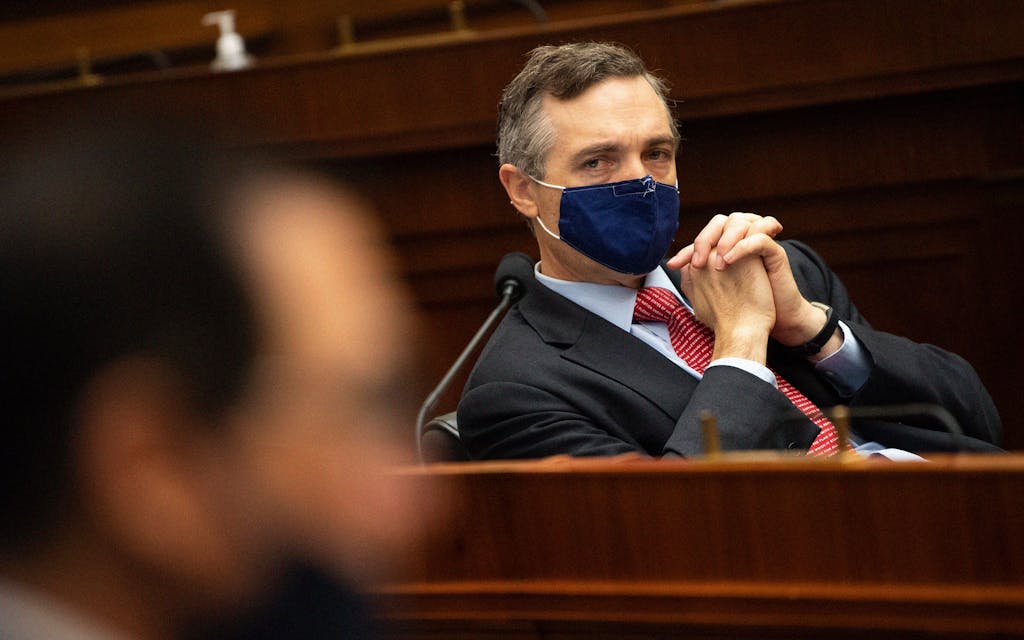
The Van Taylor Affair
Forrest Wilder, 6:15 p.m.
Van Taylor’s Republican opponents thought he would be defeated over disloyalty to Trump. Instead, he was defeated over disloyalty to his wife. In what has to be one of the weirdest, most abrupt ends to a political career, Taylor, a congressman who represents North Texas’s Collin County, admitted today to an affair with a woman known in British tabloids as the “ISIS bride” and announced that he would not campaign for reelection.
Yesterday, Taylor seemed poised to avoid a runoff, staying above 50 percent for much of the night against his four Republican opponents as the early votes were counted. But as Election Day votes came in, he dipped just below the critical 50 percent threshold by hundreds of votes, thrusting him into a runoff with the second place finisher, former Collin County Judge Keith Self. Now Taylor has effectively conceded his office to Self, who’s likely to win in November and who must be stunned to find that texts about “slow rim jobs” have handed him a job he expected to win by hammering Taylor over his votes to certify the election and appoint a commission to investigate the January 6 mob.
The salacious story broke, as many right-wing sex scandals do these days, on far-right media. National File published the first piece on Sunday, two days before primary day, with the headline “EXCLUSIVE: Van Taylor Accused of Extramarital Affair With ISIS Bride, Abuse of Power, ‘Rim Job’ Text.” The woman, Tonia Joya, told the site that she had had a nine-months-long affair with Taylor from October 2020 to June 2021 after they connected over Joya’s work preventing violent extremism. The subject of a profile in Texas Monthly in 2017, Joya gained public notice in the previous decade because of her marriage to John Georgelas, a Texan man from Plano who became the top American ISIS leader in Syria. Eventually, Joya grew disenchanted with her husband’s extremism and the travails of living in a war zone and fled Syria. Her strange and harrowing journey brought her to Texas and into the less exciting world of Congressman Van Taylor.
According to the Dallas Morning News, it was Taylor’s reelection billboards that prompted Joya to come forward. She connected with Suzanne Harp, the third-place finisher in the race, last week to talk about the affair. “All I wanted was for Suzanne Harp to just say, ‘Hey, I know your little scandal with Tania Joya. Would you like to resign before we embarrass you?’ But it didn’t happen like that,” Joya told the Dallas Morning News. But Harp had other plans. She dispatched someone to record Joya’s story. National File then published its “EXCLUSIVE” along with audio of the 30-minute interview (Joya: “my story is about my love affair with Van Taylor”) along with salacious texts purportedly from Taylor to Joya. Then, on Monday, Breitbart published another piece purporting to show that Taylor had made a $5,000 payment to Joya, which the publication described as “hush money.”
It’s impossible to know for sure, but given the Election Day fall-off in support for Taylor surely at least some voters had “ISIS bride” and “slow rim job” and “hush money” on their minds when they went in the voting booth. If the scandal had broken a day later, perhaps Taylor would have avoided a runoff and instead of apologizing and resigning, he would merely be apologizing. But that’s all a counterfactual. The bitter reality is that one of the few Texas Republicans to stand up to Trump and acknowledge that Joe Biden won the 2020 election has now been undone by his infidelities. Donald Trump, no stranger to extramarital affairs, must be having a chuckle somewhere.
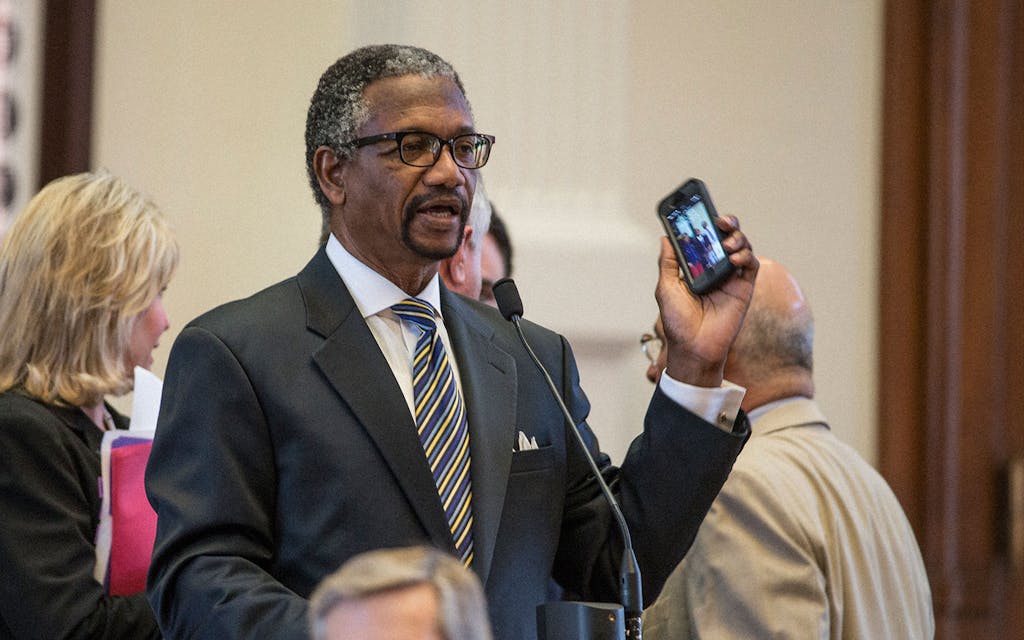
Conservative Black Democrat Harold Dutton Is Still in Jeopardy
Ben Rowen, 5:32 p.m.
Harold Dutton, a Black Democrat with a conservative bent, has represented a slice of Houston in the Texas House since 1985, and for most of the 2000s never even garnered primary challenges. But in 2020, a challenger in a three-way primary forced Dutton into a runoff, which he won. In the 2021 Lege session, he was put in charge of the Public Education Committee by Speaker Dade Phelan. The session proved testy for Dutton: after a pet bill of his calling for a state takeover of certain Houston public schools was killed on a technicality by a fellow Democrat, he seemed to retaliate, reviving a bill targeting trans student athletes. “The bill that was killed last night affected far more children than this bill ever will,” Dutton said, defending his actions when he drew progressives’ ire.
This year, Dutton drew a spirited opponent in his primary: Candis Houston, the president of the Aldine American Federation of Teachers, who had the backing of the statewide branch of that organization and the AFL-CIO, as well as the progressive PAC Annie’s List. The House Democratic Campaign Committee backed Dutton. Houston has distinguished herself from the incumbent primarily by framing herself as a staunch defender of public education, but has also criticized anti-trans legislation.
Harris County has been especially slow to count ballots this year, as we’ve noted, but as the race currently stands Dutton has a lead of only 120 votes. With no other opponents in the race, there won’t be a runoff and whoever wins will get the party’s nomination. This one is worth monitoring.
Jeff Younger, Prominent Anti-Trans Activist, Reaches a Runoff
Christopher Hooks, 5:21 p.m.
If you get your news from the “lamestream media,” you may not have heard of the Younger family, who have been headline news in conservative media for years. Now, one of the main characters in the saga has secured a spot in a runoff for a state House nomination—which means that the family may become better known over the next few years.
Jeff Younger and his wife, Anne Georgulas, are divorced, and at first, had shared custody of a child. Georgulas reports that, by age three, their child identified as a girl, growing out her hair and wearing dresses. Jeff alleges that Georgulas is forcing the child, now nine years old, to identify as female, and started a public campaign, becoming a crusader for “men’s rights” in the process. Last year, a court reviewed the evidence brought forward by both parties as to who was a more suitable parent and gave full custody to Georgulas.
This year, extending his fight, Jeff launched a campaign for Texas House District 63, in Flower Mound. Though Younger ran on a number of issues, there was a particular focus on stopping the “abuse” of trans kids. “I’ve spent over a million dollars trying to stop my ex-wife and the courts from chemically castrating my son,” relates his campaign website. “An economic crisis for any family. Texas can do better. PERIOD.” A jeremiad against teachers, psychologists, doctors, courts, and the Legislature for failing to pass bills ensuring kids can’t transition follows.
The treatment of transgender children, whose existence many Republicans deny, has become a big issue in the GOP primary, as reported on earlier in this blog. Last night, in a field of four, Younger narrowly placed second with 27.5 percent against leader Ben Bumgarner’s 29 percent, forcing a runoff. (Bumgarner is the co-owner of a gun manufacturing company called Evolve Weapons Systems.) This race is one to watch. If Younger makes it to the Legislature in this very GOP-friendly district, he’ll become a face of legislation about transgender children in coming sessions.
The Success of a Democrat-Turned-Republican
Christopher Hooks, 1:07 p.m.
Ryan Guillen lives! In November, state Representative Ryan Guillen switched parties from D to R, a major win for the GOP as it continued to emphasize its growth in South Texas and the Rio Grande Valley. Guillen was one of the most conservative Democrats in the House, but he generally had a reputation as an un-ideological and lobby-friendly fellow—his most notable legislative victory in recent years was a bill to greatly lower the sales tax on yachts, which was of limited use to the residents of his pretty poor district.
So it was an open question how Guillen would fare in today’s Republican Party, which demands a pretty high level of ideological fealty—even as Greg Abbott and Speaker of the Texas House Dade Phelan rushed to endorse him. Party switchers in South Texas have a mixed record. State Rep. J.M. Lozano switched to the Republican party in 2012 and is still there today—but State Rep. Aaron Pena defected to the GOP in 2010 and was pushed into retirement soon after. Guillen had two primary challengers, who set about making the case that he was not a real Republican—while elected Republicans set out to defend Guillen, thinking him a more valuable prize.
They succeeded. Guillen won 58 percent of the vote last night, with second-place finisher Mike Monreal scoring 36 percent. Guillen is likely to win re-election in November—he defected primarily because his district had been made more Republican. Perhaps in time, he’ll abolish the yacht sales tax altogether.
A Note on Democratic Turnout in South Texas
Jack Herrera, 12:24 p.m.
As the sun rose across South Texas, from Laredo all the way down the Rio Grande to Brownsville, the final counts in the March 1 primary made one thing clear: Democrats had shown up in much, much higher numbers than Republicans.
In the Fifteenth Congressional District, anchored in McAllen and where Republicans have their best shot at flipping a soon-to-be vacant seat, Democratic primary voters outnumbered Republicans by about 20,000 to 16,000. The daylight between the Dems and the GOP was even greater in the Thirty-fourth, anchored in Brownsville, at 29,000 to 10,000, and the Twenty-eighth, anchored in Laredo, at 24,000 to 13,000. But turnout in primaries often does not predict the results of the general election. And in South Texas there’s another confounding factor: many Republicans vote in the Democratic primaries.
Because city and county offices in Laredo have long been dominated by Democrats, there are often no Republicans running in certain races (though some Republican super PACs are trying to change that). That means that many Republicans who want to vote on local political issues in the primaries have resorted to casting ballots in Democratic races. “It’s not fair, but that’s the way the system is,” said Juan Ramirez, a Laredo business owner who cast his vote yesterday in the Democratic primary.
Yesterday, outside the Guerra Centre, a polling place in central Laredo, Ramirez told me he’s supported Republicans every year since JFK’s assassination. However, that didn’t stop him from voting enthusiastically for a Democratic congressman in the primary. Though Ramirez lambasted the Biden administration and the policies of national Democrats, he said he’s a longtime strong supporter of Henry Cuellar.
“He’s one of the few Democrats who [extends his] hand to the Republicans sometimes,” Ramirez said, explaining that he admires that Cuellar is willing to break with party leadership and vote with the GOP on certain key issues, such as increased oil drilling, aggressive border enforcement, and anti-abortion policies. He also admires the funding Cuellar has managed to bring to Laredo, in part through the congressman’s position on the powerful House Appropriations Committee.
“All the years he’s been in office, he knows how to get the money for the city, he knows how to do things, and he does them,” Ramirez said. “With the infrastructure, with the airport—sometimes we have problems with water and sewer, and he gets involved.” (Over the last week, much of Laredo went without running water, and many houses are still under a “boil water” notice now that service has been restored. Cuellar has frequently posted updates on social media and has said his team is distributing bottled water to residents.)
Cuellar has long courted votes from right-wing voters. A self-proclaimed Blue Dog and one of the most conservative in his caucus in the House, Cuellar represents an increasingly rare breed of Democrat. His unique stances speak to the complexities of politics in South Texas. He has built his reputation—and staked his political future—on the bet that South Texans want a centrist, conservative Democrat representing them in Congress. “Some of my Hispanic colleagues have told me, ‘You’ve got to be careful about the way you vote,’ ” Cuellar told me in 2021, explaining how he’s taken flak for his conservative stances. “I tell them, ‘I think I know my district, and I think I know it better [than you do] … I’m doing what I think is right, listening to my folks.’ ”
Jessica Cisneros, an AOC-aligned immigration lawyer, is trying to prove Cuellar wrong. Last night, she and Cuellar both succeeded in making the runoff election for the next primary vote on May 25. Cisneros is running an unapologetically left-wing campaign, supporting Medicare for all and the Green New Deal, as well as more humane border and immigration policies.
The Other Big Democratic Runoff in South Texas
Ben Rowen, 11:41 a.m.
One Texas Senate race I highlighted yesterday merits a follow-up—the Democratic primary to replace retiring Democrat Eddie Lucio Jr. in a South Texas seat anchored around McAllen. With redistricting and the rightward shift that happened in the Rio Grande Valley in 2020, Senate District Twenty-seven figures to be more competitive than it’s been in a long time. A wide spectrum of Democrats entered the race, which will be heading to a runoff. “Different Democrat” Morgan LaMantia, an attorney and Democratic donor who earned the endorsement of Lucio—who was the most conservative Democrat in the Senate last session—will face off against attorney Sara Stapleton-Barrera, a progressive who forced Lucio into a runoff in 2020 before falling short. This year the race, like the U.S. House runoff in Congressional District Twenty-eight between Henry Cuellar and Jessica Cisneros, will test whether Blue Dog-style Democrats, who’ve long dominated South Texas politics, are losing ground to progressive Democrats.

Cuellar and Cisneros Advance to Runoff
Jack Herrera, 9:54 a.m.
As the clocks ticked past 2 a.m., the Associated Press called the Democratic primary for the congressional seat in District 28: It was going to a runoff on May 24. Incumbent Congressman Henry Cuellar and Jessica Cisneros will face a rematch in May, after both failed to pass the 50 percent threshold to win outright. After trailing in the count most of Tuesday night, Cuellar had taken a slim lead with nearly all the votes tallied. This morning, with 95 percent of the vote counted, Cuellar led Cisneros 48.5 to 46.8.
About three hours before the vote was called, Cisneros spoke to her family and supporters at a jubilant watch party in northeast Laredo. “It’s not looking like we’ll have results tonight,” she said, as a projector flashed up a live vote count that showed her holding a slim lead. Unable to read her victory speech, Cisneros talked about how the closeness of the race was its own sort of victory. When Cisneros, an immigration attorney, announced her first run against Cuellar back in 2019, the high-ranking House Democrat seemed invulnerable. Then serving his eighth term and backed by a powerful network of businesspeople and local officials in South Texas, Cuellar was sometimes called “The King of Laredo”—a moniker that wasn’t always a compliment. Aided by Justice Democrats, the left-wing PAC that recruited Congresswoman Alexandria Ocasio-Cortez during her upset primary win in New York, Cisneros almost took Cuellar down: He spent $2 million to beat her by just under 4 percentage points.
Two years later, Cisneros said, the even tighter race was just more proof that her progressive vision—including universal health care, massive investment in green jobs, and welcoming immigration reform—is working in South Texas. “We are showing that our dreams can compete, neck and neck,” she said. “We’re going to prove that we, as a people, are more powerful than any kind of money that they put their faith in.”
The primary was marked by drama—and not just the usual campaign fireworks. In late January, FBI agents raided Cuellar’s Laredo home and campaign office. The FBI later said the raid was part of a wide-ranging FBI probe into a group of US businessmen and the government of Azerbaijan. Though Cuellar has not been indicted—and says the investigation will clear him off any suspicion—the raid likely hurt him on Tuesday.
A third candidate in the race, Tannya Benavides, also ran to Cuellar’s left. Benavides finished with just less than five percent of the vote.
That’s All for Tonight, Folks
Ben Rowen, 12:56 a.m.
Twelve hours in, we’re going to call it a night here. Thanks for following along.
The headline results of the night are Greg Abbott’s outright win in the GOP gubernatorial primary, Ken Paxton and George P. Bush qualifying for a runoff for the GOP nomination for AG, and democratic socialist Greg Casar’s win in a U.S. House primary in a deep blue district that all but assures he’ll be the representative next year.
Be sure to check back in the morning for updated results on two races: the Democratic primary in the Twenty-eighth Congressional District, anchored in Laredo, where incumbent Henry Cuellar and Jessica Cisneros appear to be headed to a runoff, and the Democratic primary for attorney general, where former ACLU lawyer Rochelle Garza will face a runoff opponent—though it’s not yet clear whom.
Closing Thoughts
Christopher Hooks, 12:46 a.m.
God makes all primary seasons in his image, but he likes some of them more than others. Some are packed to the brim with lunacy and derangement, or set in motion ideological shifts that change the state for good. Others kinda sputter. This one sputtered.
The Republicans who run state government have each been there for two terms, enough to get dinged up. But Greg Abbott won renomination with 70 percent of the vote over some very loud challengers, and a guy named Rick Perry (not that Rick Perry). Dan Patrick has his fair share of intraparty detractors, but he got no challenger worth mentioning. An attempt to unseat Sid Miller fizzled. Ken Paxton had three strong challengers and was forced into a runoff, but none of his opponents ran particularly strong either—with second place finisher George P. Bush running twenty points behind. In the House, Speaker Phelan helped defend his incumbents. In the Senate, Patrick helped elect new loyalists. This one’s pretty standard, as these things go.
Underneath Beto O’Rourke, the results for Democratic statewide races suggested that most Democratic voters are picking names at random for many offices when they step into the voting booth. This is also not new. There will be a few crackerjack runoffs—particularly Paxton versus Bush, and Henry Cuellar versus Jessica Cisneros for the U.S. House in South Texas. Then we’ll go to the general election, where vanishingly few districts are competitive and the outcome of most races will seem preordained. It’s called Democracy, folks, and it’s a beautiful thing.
Morgan Luttrell Waits for Harris County
Michael Hardy, 12:40 A.m.
Shortly after midnight, retired Navy SEAL Morgan Luttrell took the microphone in the Houston suburb of Conroe to announce . . . that the crowd would have to wait a bit longer. Luttrell, who is running to represent U.S. House District 8, currently leads an eleven-person field with 53.1 percent of the vote and is aiming to stay above 50 percent to avoid a runoff. The deep red district runs from the Houston suburbs north to the Davy Crockett National Forest, near Lufkin. An estimated 90.6 percent of votes have been counted, but Harris County is filling its traditional role as an election laggard and has reported fewer than two hundred votes, almost evenly divided between Luttrell and his closest competitor, Christian Collins.
“I want to be able to tell you it’s done, but Harris County has not come through yet,” Luttrell told the crowd of a couple hundred supporters, many of whom have been waiting since 7 p.m. The crowd has thinned a bit, but plenty of people remain, eagerly anticipating a victory speech. Luttrell said he wanted to be absolutely sure he had avoided a runoff before making an announcement. “I never want to mislead you, so I’m not calling this thing yet,” he said. “It’s going to be a long night. But we’re doing great.”
Luttrell said he would stay at the election watch party until Harris County reported its votes, and invited the crowd to stay with him. Most of them appeared to take him up on the offer, settling in for a long wait.
Dan Patrick’s Candidate Appears Likely to Prevail in Amarillo
Ben Rowen, 12:34 A.m.
Earlier today I wrote about the Texas Senate race to replace Kel Seliger, a sometimes Dan Patrick–crossing Republican in the Trumpiest district in the state. In November, after Seliger refused to support a bill to require a full audit of the 2020 Texas election results, which Donald Trump had called for despite his win here, the former president endorsed Midland oilman Kevin Sparks. Lieutenant Governor Dan Patrick followed suit. Seliger announced his retirement.
The race to replace him hasn’t been called yet, but Sparks is above the 50 percent threshold needed to avoid a runoff, with 97 percent of the vote in. Should he hold on to that lead, he won’t face a Democrat in the general election, and Patrick will have the fully compliant GOP caucus in the Senate he has long been building.
Close, but No Cigars Were Lit at Jessica Cisneros’s Watch Party
Jack Herrera, 12:26 A.m.
The mood at Jessica Cisneros’s election night watch party in Laredo reached a level close to euphoria at just past 7 p.m. on Tuesday night, when the early results showed her leading incumbent Democratic congressman Henry Cuellar by as many as forty percentage points. By the time Cisneros herself took the stage four hours later, however, the most likely result looked to be a runoff; Cisneros and Cuellar were virtually even, with both of them falling below the 50 percent threshold for an outright victory, thanks to the votes won by a third candidate.
In her speech to supporters, Cisneros acknowledged that she didn’t expect final results till Wednesday. But she still claimed a sort of victory: “When I announced my first run in 2019, people told me this wasn’t possible.” But after the young human rights attorney lost in 2020 by fewer than four percentage points, no one made the mistake of not taking her seriously in this year’s rematch with Cuellar, and Cisneros demonstrated that she has a serious community movement behind her. “We are showing that our dreams can compete neck and neck,” she said. “We’re going to prove that we, as a people, are more powerful than any kind of money that they put their faith in.”
Even as the results got closer Tuesday night, Cisneros supporters remained elated. For her family and supporters, used to playing catchup to Cuellar, seeing Cisneros’s name first in the vote total had people beaming, even if it’s not the final result. As the clock reached midnight, Cisneros’s communications director took the stage and said, sheepishly, “They’re going to charge us more for the venue if we don’t leave now.” The room was still full, but folks laughed good-naturedly and began filing out. There wouldn’t be any victory speeches tonight.

Ken Paxton and George P. Bush Will Face Each Other in a Runoff
Forrest Wilder, 11:50 p.m.
In one of the marquee races of the night, we have a pair of winners—and a couple of also-rans. Texas attorney general Ken Paxton is headed to a runoff with land commissioner George P. Bush to decide who will run as the Republican nominee for Texas AG in the fall. With 86 percent of the vote counted, Paxton collected 43 percent of the vote to Bush’s 22 percent. For much of the night, Bush and Eva Guzman, the former Texas Supreme Court justice backed by much of the Big Business establishment in Texas, were neck and neck, vying for who would get the honor of taking on Paxton in what is sure to be a bruising, low-turnout May runoff. But Bush was able to gain the edge, in part by besting Guzman in the Rio Grande Valley, Dallas, El Paso, San Antonio, Fort Worth, and some suburban counties such as Collin, near Dallas, and Williamson, near Austin. In recent weeks Paxton previewed how he would run against Bush in a runoff: by calling him an establishment tool who feels entitled to higher office as part of the family dynasty. Paxton will sell himself as the true happy conservative warrior—the guy whose record of owning the libs and supporting Trump is untarnished. Those criminal charges? The work of the establishment, the same establishment that loves Bush so much. Did I mention that Trump endorsed me, not Bush?
Bush, for his part, told the press this evening that he plans to consolidate support from Guzman and Louie Gohmert, who came in fourth with around 17 percent, as well as the big-money backers who funded Guzman. Bush will keep hammering Paxton as damaged goods, a ripe target for Joe Biden’s Justice Department to drop an indictment on him around the time the general election campaign is revving up in late summer.
It’s hard to predict what will happen in a runoff, and it’s no doubt possible that Bush can beat Paxton. But Paxton’s 43 percent plus currently-in-fourth-place challenger Louie Gohmert’s 17 percent makes 60 percent, and it’s a little hard to imagine Gohmert voters breaking for Bush over Paxton in large numbers. Even so, this will be the biggest race in Texas in the next few months—expect a brawl.

Trump-Endorsed Republicans Run the Table
Michael Hardy, 11:32 p.m.
Trump made endorsements in 33 Texas races this cycle, from the governor’s race down to Tarrant County district attorney, and he’s currently batting close to a thousand. By Texas Monthly’s calculation, no candidate who received Trump’s endorsement has lost, and only five have been forced into runoffs—Attorney General Ken Paxton, land commissioner candidate Dawn Buckingham, state senator candidates Pete Flores and Frederick Frazier, and Tarrant County district attorney hopeful Phil Sorrells. All five Trump-approved candidates headed for runoffs won a plurality of the vote, and will likely be favorites to win outright.
Of course, when you mainly endorse incumbents, as Trump did, you’re likely to maintain a good track record. Trump endorsed 16 of 21 Texas Republicans running for reelection to Congress, and two candidates for open seats. (Four of the five incumbents he snubbed happen to have voted to certify Joe Biden’s election.) At the time of publication, every congressional candidate he endorsed appears to have won their nomination outright.
Does (Alleged) Crime Pay in Texas Elections?
Forrest Wilder, 11:10 p.m.
A Republican consultant recently told me that one of the megatrends in politics in recent years is that voters, both Republicans and Democrats, care less about scandals and wrongdoing, up to and including criminal activity, than in more settled times. This year’s Texas primaries seem to confirm that. Attorney General Ken Paxton, under indictment and dealing with enough alleged crimes to keep a mob lawyer busy, is comfortably on his way to a runoff. Already, at his victory party, Paxton is telling supporters that the runoff is all about taking on “the establishment”—he’s directly referring to George P. Bush, his likely runoff opponent, but also no doubt the deep state agents attacking Paxton and the conservative movement.
On the Democratic side, conservative Laredo congressman Henry Cuellar is almost certainly headed to a runoff with progressive challenger Jessica Cisneros. That’s not the best-case scenario for Cuellar, but keep in mind that it was just a weeks ago that the FBI raided his Laredo home in connection with an investigation into nonprofits and companies with ties to the state-owned oil company of Azerbaijan. Cuellar has not been charged with anything and has denied wrongdoing, and details about the grand jury probe are scarce. Nonetheless, voters weren’t moved enough by at least the suggestion of impropriety to change representatives. Meanwhile, state representative Ron Reynolds, a Houston Democrat, just cruised to another term after winning reelection in 2018 while serving a four-month stint in jail following a conviction for “ambulance chasing for profit.” Reynolds crushed his Democratic opponent by an 85–15 margin.
And finally there’s Justin Berry, an Austin-area Republican and Austin police officer who is one of 19 APD officers to be indicted recently for allegedly using excessive force on BLM protesters in 2020. He’s on his way to a runoff in the deep red House District 19.
Harris County Struggles to Count Votes—Once Again
Michael Hardy, 11:01 p.m.
With more than 4.7 million residents spread out across nearly 1,800 square miles, it’s not surprising that it takes time to count votes in Harris County. But should it really take this long? Election after election, the greater Houston area is one of the last parts of Texas to report its votes. Four hours after polls closed, Harris County elections administrator Isabel Longoria’s office has just started releasing a trickle of Election Day results. That leaves reporters to rely on early voting numbers, which represent around 50 percent of the expected vote totals. Without knowing how Houston voted on Election Day, it’s hard to determine who won close statewide races, let alone countywide positions.
Shortly after polls closed this evening, Texas Secretary of State John Scott released a statement claiming that Harris County officials couldn’t commit to counting all the votes by Wednesday at 7 p.m.—the deadline set by state law. According to the statement, the delays result from “damaged ballot sheets that must be duplicated before they can be scanned by ballot tabulators”—a reference to Harris County’s cumbersome new paper-based voting system. Scott publicly offered his office’s help
For years, Texas political junkies heaped scorn on former Harris County clerk Stan Stanart’s sluggish vote reporting. The hashtag #firestanstanart showed up in Twitter feeds every election night. But after Stanart lost reelection in 2018, the problems continued. Then-interim county clerk Chris Hollins won widespread praise for his brief stint overseeing the 2020 election, but after his tenure the Harris County Commissioners’ Court removed authority for conducting elections from the elected clerk and gave it to the newly created position of elections administrator. The commissioners appointed then-32-year-old Isabella Longoria, who formerly served as a special voting rights adviser to the county clerk.
The Harris County elections administration did not immediately respond to Texas Monthly’s request for an explanation for the delayed reporting.
Who Will Make the Runoff Against Ken Paxton?
Ben Rowen, 10:54 p.m.
As expected, Ken Paxton is heading to a runoff for the GOP nomination for attorney general. The question of who his opponent will be remains, though things are getting a bit clearer. With around 80 percent of ballots counted, George P. Bush is currently in second place with 22 percent of the vote, to Eva Guzman’s 18.
Louderback Rides Into the Sunset
Michael Hardy, 10:30 p.m.
A.J. Louderback just learned that winning a seat in Congress is a whole lot harder than getting elected small-town sheriff. The five-term lawman in Jackson County never faced serious political opposition until he decided to challenge incumbent Michael Cloud, a Trump-endorsed businessman who just won the primary in the southeast Texas district with 73.1 percent of the vote. Louderback, who attempted to out-MAGA Cloud with hard-line rhetoric about guns and immigration, limped into second place with just over 11 percent of the vote. Louderback stepped down as sheriff in December to challenge Cloud in the Twenty-seventh Congressional District, which stretches from Corpus Christi to the outer Houston suburbs.
Checking In on the World’s Second Greatest Deliberative Body
Christopher Hooks, 10:20 p.m.
In Texas House District 79, northeast of El Paso, state representatives Art Fierro and Claudia Ordaz Perez were pushed into the same race by redistricting. Democrats took sides. Fierro, who returned early from last year’s quorum break, was endorsed by state representative Joe Moody, the ranking Democrat in the House, who also returned early. Ordaz Perez was endorsed by Democrats who stayed. It wasn’t close—Ordaz Perez is winning, 67 to 33 percent.
Shelley Luther, the COVID cause célèbre who was briefly jailed in May 2020 for violating Governor Greg Abbott’s executive orders requiring that hair salons stay closed, ran this year in House District 62, against incumbent Reggie Smith. She once again won fame when she got tongue-tied and appeared to object to the principle that trans children shouldn’t be bullied in schools. This did not work, and Smith is beating Luther by twenty points.
In Harris County, Voters Judge the Judges
Michael Hardy, 10:11 p.m.
The all-Democratic slate of Harris County criminal court judges has been under sustained attack by District Attorney Kim Ogg, who accuses them of letting too many people out of jail on low bonds. The attacks seem to have made a difference—at the moment, at least half a dozen incumbent judges are losing their primary races. (With the caveat that, thanks to delays in reporting from the Harris County election administration, Election Day votes haven’t yet been counted—a bit over 50 percent of the total is in.) In the race for the 184th District Court, for instance, incumbent Abigail Anastasio is well behind challenger Katherine Thomas, an assistant district attorney under DA Ogg. Thomas is just one of the fourteen Ogg prosecutors who are running for Harris County judgeships this year. We’ll be watching to see how many of them advance to the general election in November.
Let’s Talk About South Texas Turnout Real Quick
Dan Solomon, 10:03 p.m.
One of the big stories out of 2020 was the GOP growth in South Texas. While we won’t know if that was an outlier or the start of a trend until we have more data—i.e., until November and beyond—one piece of information that might be worth noting is that throughout South Texas and the Rio Grande Valley, turnout on the Democratic primary ballot eclipsed that on the GOP side.
This is most striking in the Fifteenth Congressional District, which was redrawn into a “lean Republican” seat according to the Cook Political Report. In the GOP’s big pickup hope, with rising star Republican Monica De La Cruz on the ballot (she’s doing great, incidentally, running well ahead of a runoff), Democratic primary voters outnumbered Republicans 20,000 to 16,000. The 25 percent advantage among Democrats in the Fifteenth is dwarfed by the ones in the Twenty-eighth (24,000 to 13,000) and the deeper blueThirty-fourth (29,000 to 10,000). Primary turnout doesn’t correlate directly to general election turnout, of course—but if you’re looking for a new data point as you try to make sense of what exactly is going on in South Texas, the turnout advantage among Dems tonight is one to keep in mind as you make your predictions.
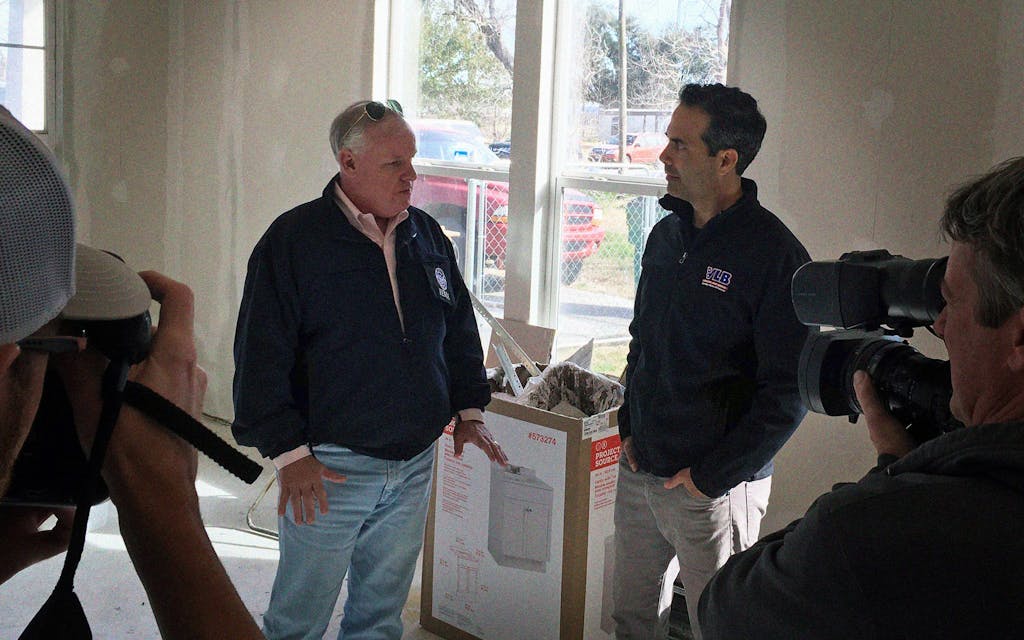
Houston Remembers George P. Bush’s Hurricane Harvey Debacle
Christopher Hooks, 9:58 p.m.
The most important outstanding question tonight, on the statewide ballot, is who will accompany Attorney General Ken Paxton into his Republican primary runoff: George P. Bush or Eva Guzman? With about three-fourths of the vote in, Paxton is sitting at 42.5 percent. Bush is pulling 21.5 percent, while Guzman is winning 19.5 percent. Guzman and Bush have been trading places most of the night. Bush is outperforming Guzman in South Texas, where his campaign has focused. Guzman is performing a bit better in cities. In Dallas and Tarrant Counties, Bush and Guzman are about even—in Travis and Bexar counties, Guzman is a few points ahead.
But in Harris County, the largest pool of votes in the state, Bush is getting trounced by Guzman two to one. There was a lot of anger in Houston over the way Bush’s office handled Harvey relief money, with many feeling the city had been shafted. He probably regrets that tonight—but he may squeak past Guzman regardless.

CD-8’s Lone Survivor
Michael Hardy, 9:52 p.m.
Several hundred people have gathered at Honor Cafe in the Houston suburb of Conroe for congressional candidate Morgan Luttrell’s election watch party. With about 80 percent of the votes counted, Luttrell, a retired Navy SEAL, currently leads the field of eleven candidates with 53 percent—enough to avoid a runoff in the race for the Eighth Congressional District. The next highest vote-getter, with 22 percent, is Christian Collins, a political operative endorsed by Ted Cruz, Marjorie Taylor Greene, and much of the far-right House Freedom Caucus. Jonathan Hullihan, a Navy JAG attorney who has positioned himself even further to the right, is in third with 12 percent.
Several Luttrell supporters told me they were turned off by Collins’s campaign mailers calling Luttrell a RINO (Republican in Name Only). “People who know Luttrell and his character just threw those in the trash,” said Teresa Poore, a booking agent for Team Never Quit—a veteran-focused speakers bureau that represents Luttrell’s brother Marcus, a fellow Navy SEAL and the inspiration for the film Lone Survivor. “He thinks for himself. He’s not going to be a puppet.”
Given his high-profile supporters, Collins’s failing to make the runoff would be a major blow. But it’s a victory for U.S. House Speaker Kevin McCarthy, who backed Luttrell with funding from a super PAC associated with the House leadership. Given the congressional district’s deep-red voting record, Luttrell is practically a shoo-in against Democratic nominee Laura Jones, who ran unopposed.
“Collins was too negative with the mailers,” another Luttrell supporter, who declined to give his name, told me. “Luttrell is more focused on the issues rather than attacking people.”
The Democratic Race for Land Commissioner Is a Crapshoot
Forrest Wilder, 9:44 p.m.
Another Democratic primary, another set of somewhat random results. It’s too early to call a lot of the statewide races—Beto’s overwhelming victory in the governor’s race aside—but it’s not too early to scratch our heads over some of the results. Take a look at the four-way race for land commissioner. At present, licensed therapist Sandragrace Martinez is leading with 30.6 percent of the vote followed by conservationist Jay Kleberg (27.7 percent), followed by Jinny Suh (21.4 percent), followed by Michael Lange (20.3 percent).
Statistically, this is not too far away from an equal split among the candidates—a result that could, one might argue, be the result of essentially a coin flip among voters. The current front-runner is an unknown in Texas politics who raised just a few thousand bucks. Ditto for Michael Lange. Suh is also an unknown but raised a more respectable—if we’re being generous—$76,000 or so. Only Kleberg, a scion of the King Ranch, can be said to have anything like name recognition or the kind of cash one needs to mount a statewide campaign. And yet he will be counting his blessings just to make a runoff.

The GOP Railroad Commissioner Race Is Taking a Surprising Turn
Russell Gold, 9:36 p.m.
It looks like it’s the Grammy-nominated, gospel-singing septuagenarian incumbent versus the millennial, social media–savvy, pasty-wearing lawyer in a runoff to remember. In the GOP railroad commissioner race, it appears that incumbent Wayne Christian will not have enough votes to win outright and is heading to a runoff against Sarah Stogner.
Meanwhile, neither has as many votes as . . . Democrat Luke Warford received in the Democratic primary? Okay, okay, before you start thinking Texas is turning purple, it’s worth noting that he didn’t have anyone running against him—and there were five Republicans splitting the vote in the other primary.
Is Jessica Cisneros Heading to Victory—Or to a Runoff?
Jack Herrera, 9:10 p.m.
Two years ago, powerful congressman Henry Cuellar held off a Democratic primary challenge from progressive human-rights lawyer Jessica Cisneros, prevailing by less than 4 percent. In the rematch, it appears that Cisneros could be on her way to unseating the incumbent—or to a runoff with him. With roughly half the votes counted, she has barely more than 50 percent of the vote, with Cuellar at 45—and a third candidate, progressive lawyer Tannya Benavides, at 4.6 percent.
In Bexar County, which includes San Antonio, Cisneros has a commanding lead—more than her margin in 2020 there. But Cuellar leads in Webb County, home to Laredo—also besting his 2020 margin. More than 70 percent of the vote has been counted in both counties.
Cuellar had seemed likely to win again this year until his campaign was hobbled by an FBI raid on his home and campaign office in late January, as part of a wide-ranging probe into a group of U.S. businessmen and the government of Azerbaijan. Though Cuellar has not been indicted—and says the investigation will clear him of any suspicion—the raid nonetheless gave new life to Cisneros’s second bid, driving home the perception some voters have of Cuellar as corrupt.

Beto O’Rourke’s Inevitable Primary Victory
Christopher Hooks, 8:52 p.m.
No surprise here, but Beto O’Rourke is cruising to the Democratic nomination for governor with 92 percent of the vote. In 2018, O’Rourke ran into trouble in his primary for the U.S. Senate nomination, winning only 62 percent of the vote and losing many counties outright in South Texas. This time, though, Democratic voters seem to be familiar with him.

Greg Casar, a Democratic Socialist, Has Won His U.S. House Primary
Dan Solomon, 8:48 p.m.
Though a snafu with the Travis County vote count kept the celebration on ice for a while, when the results came in, there was little doubt about who had won in the Thirty-fifth Congressional District: Greg Casar. Around 8:10 tonight, former Austin city councilman Casar took the stage at Austin bar Native Hostel to declare victory—without a runoff—over his three opponents. Casar took 71 percent of the vote in his hometown, which comprises the largest share of the voters. Combine that with a fifteen-point lead in Bexar County over his closest challenger, and the math was clearly in Casar’s favor.
The 32-year-old democratic socialist immediately becomes the presumptive next representative in one of the state’s most reliably blue districts, which only deepened the celebratory air of the watch party. Supporters and volunteers sipped hard cider on the gravel patio next to I-35 alongside Austin political figures—Mayor Steve Adler among them—while Casar snapped celebratory selfies. Up next? Likely a frustrating spell in the minority if the GOP takes the House. But for tonight, at least, Casar and his supporters are all smiles.

Greg Abbott Wins the GOP Nomination Outright and Avoids a Runoff
Christopher Hooks, 8:36
Greg Abbott has clinched renomination, and despite several years of anger from the right, it wasn’t much of a fight. With a little more than half the votes counted, Abbott has 69 percent of the vote. His two main challengers—libertarian Don Huffines and tea party hero Allen West—performed absolutely dismally, each pulling in about 11 percent of the vote. (The False Rick Perry, a man from Springtown—not the former governor—is winning only 3 percent, while Baroness Kandy Kaye Horn is winning only 1 percent, proof that Texas voters don’t know what’s good for them.)
The biggest political story in the state for much of the pandemic was how angry right-wing voters were with Abbott over COVID restrictions. They were extremely loud. And there weren’t, evidently, very many of them. Haters may hate, but Abbott abides.
Robert Morrow Doffs His Jester Cap Once More to State Board of Education District 5
Dan Solomon, 8:22 p.m.
Perennial candidate (and occasional election-winner) Robert Morrow—whom voters may recall from his habit of wearing a jester’s cap to Travis County GOP meetings when he was somehow elected party chair, or perhaps for his undying affection for tweeting improbable anime boobs—is once more on the ballot, and once more doing pretty well. This year he’s running for the GOP nomination for a State Board of Education seat in an Austin-based district against physics PhD and textbook author Mark Loewe, and has received 49 percent of the vote so far, with 17 percent of ballots counted. Why? Who knows! Morrow doesn’t really have a constituency, but also voters don’t often know who the candidates are in primary races for positions like State Board of Education.
Even if Morrow prevails here, he is likely to lose the seat to Democratic incumbent Rebecca Bell-Metereau—but if you’re a fan of grown men who are just proudly who they are spending time in the public eye, there’s a real possibility you’ve got eight more months of Robert Morrow in your life.
Sid Miller Looks Likely to Survive
Christopher Hooks, 8:08 p.m.
Too early to call, but it certainly looks like state representative James White’s primary challenge to agriculture commissioner Sid Miller has failed. With about 20 percent of the vote in, Miller is winning about 60 percent of the vote to White’s 30. The main threat left to Miller, who has become Texas’s chief poster of memes in his eight years in office, is that he dips below 50 and then has to fight a runoff.
If Miller wins, he’ll continue to face a hostile Legislature and Republican establishment—while a felony corruption trial for his former top aide draws nearer. White, meanwhile, will be missed in the Legislature. Though a staunch conservative, he was respected by lawmakers from both sides of the aisle, and his voice on criminal justice issues could be helpful in breaking gridlock on reforms.
Don Huffines Claims Moral (But Not Political) Victory
Ben Rowen, 7:59 p.m.
It’s early, but with nearly a third of the vote counted, Greg Abbott is winning nearly 70 percent of the vote, comfortably above the threshold to avoid a runoff. In second place with just more than 12 percent of the vote is Don Huffines, who has already offered what passes for concession remarks these days, tweeting, “For over a year our campaign has driven the narrative in Texas and forced Greg Abbott to deliver real conservative victories. . . .”
It’s a remarkable change in tone from when we spoke after a campaign event in Dripping Springs in January. I had asked Huffines if he considered it a victory just having pushed Abbott right on issues including abortion, permitless carry of firearms, and vaccine mandates. “Yeah, sure, it’s a win, but it’s not enough of a win,” he said. “It’s just not. Abbott is a political windsock. So he’ll go back the other way, and he’s just going to pivot wherever the political winds are blowing.”
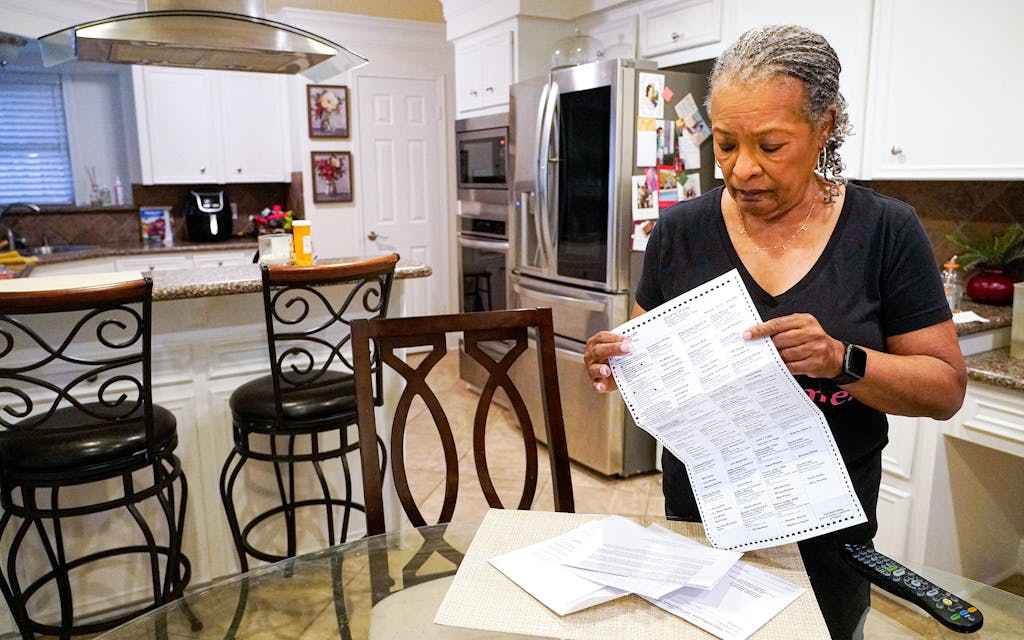
Welcome to the Texas Voting Obstacle Course
Michael Hardy, 7:24 p.m.
All day, social media was filled with accounts of Texas voters frustrated by our byzantine new election law. Senate Bill 1, passed by the GOP-dominated Legislature last year, has turned requesting an absentee ballot into an elaborate game in which voters must remember what form of ID they used to register to vote, then write that number in the correct spot on the envelope they mail in. As of February 18, the state’s most populous counties had rejected around 10 percent of absentee ballot applications. In Harris County, that number was 30 percent.
Even someone as politically savvy as former Houston mayor Annise Parker got tripped up by the process. Parker, her wife, and her mother are all over 65 and traditionally vote by mail. They successfully requested paper ballots, but after mailing them in, Parker and her mother learned that theirs had been rejected because they failed to write their ID numbers in the correct place. They managed to submit new ballots, which they hope will arrive by the deadline of tomorrow. Parker’s wife’s ballot was also rejected, but she found out too late to correct it by mail. When she attempted to vote in person today she was turned away, Parker told me.
“[SB 1] has taken a straightforward process that is extremely beneficial to voters and made it much more difficult, for no apparent reason,” Parker said. “This is a completely unnecessary law. I think the initial target is Democratic voters, minority voters, but over time it will have a disproportionate impact on others as well, because so many elderly voters are Republican.”
Amber Kimbrell, a farmer in rural Moore County, north of Amarillo, blames SB 1 for her own voting problems. Two weeks ago she received a letter from her county election administrator asking her to prove that she lives at the address on her voter registration form. Kimbrell, who has lived at her address for more than fifteen years, couldn’t understand why she received the letter—after all, her husband lives at the same address, and he didn’t receive a letter. Kimbrell contacted the election office and confirmed her address, but the experience has shaken her faith in the state’s voting laws.
“I hope my vote counted, but I have no way to prove that it counted,” she told me. When I asked why she thought she received the letter, she didn’t hesitate. “I don’t think Greg Abbott wants me to vote. That’s what I honestly think.”
Checking In on Van Taylor and the “Big Lie” Primary
Forrest Wilder, 7:13 p.m.
Earlier today, I wrote about how “Stop the Steal” messaging is animating one primary in North Texas. We now have early results from Collin County in the race. If this holds, Taylor could narrowly avoid a runoff, but there are still lots of votes to count.
The Panic That The Kids Are Not Alright
Christopher Hooks, 6:59 p.m.
Texas primary elections of all kinds often hinge on issues that are kind of irrelevant, but the parties chase irrelevancy in different ways. Democrats love to talk up policies they’ll never in a hundred years have the political power to implement. Republican partisans, meanwhile, find the most minute differences possible between each other—the one thing that didn’t go right out of ten things that did, on an issue most people could hardly find the energy to care about—and beat each other half to death with them. There’s an imbalance here that colors everything else. Democrats are out of power and need to look serious, while Republicans have all the power and so don’t need to look serious.
This has been a traumatic and difficult few years for Texans of all stripes. The terrible economic collapse of 2020 was mended, but the economy remains shaky, with the cost of living spiking around Texas, particularly in cities that have become overwhelmed with growth. A little more than a year ago, Texas saw the worst man-made disaster in its history, which killed more than seven hundred people, and which was caused largely by greed and the incompetence of state government. A pandemic, which was much more fatal here than in peer states such as California, exposed severe weaknesses in the state’s health care system and social safety net. And while left and right fought over the state’s COVID restrictions in debates that were usually louder than they were wise, the pandemic raised real questions about the governor’s authority to implement his emergency orders. What does it mean to give the executive sweeping powers in a state in which legislators, the only ones who can check him, are mandated to meet for only five months out of every twenty-four?
Naturally, debates in the GOP primary skirted most of these questions—even the question of what to do about Abbott’s executive power, on which Republicans have a substantive case to make. Instead, we talked about—most of all—the children.
The tone of the primary was set by former representative and current candidate for Tarrant County DA Matt Krause, who in October released a list of 850 books in school libraries that “might make students feel discomfort, guilt, anguish, or any other form of psychological distress because of their race or sex.” He wanted to get rid of them. Life is discomfort, of course. Psychological distress is the price we pay for living. In Fun With Dick and Jane, we are confronted by the troubling realization that, though we are all human, the duality of sex means that we can never truly understand one another—we will be forever apart. That book is not on Krause’s list, but a bunch of books about how Black people got a raw deal in America were.
The moral panic about children took on a seedier, grubbier, more menacing tone as time went on. Following the last Lege, grassroots conservatives were very mad that leaders had not acted more aggressively to stop the “genital mutilation” of children, which is what they call treatments given to some children that identify as transgender—mostly hormone therapy. They didn’t get the bill they wanted, and they stayed mad. So, in the past few weeks Ken Paxton and Greg Abbott, who both need to avoid a runoff, took bold action. Last week, Abbott ordered state agencies to investigate the parents of trans children for child abuse, weeks after Texas attorney general Ken Paxton issued an opinion that gender affirming care for children is such. Today, it was announced that the first investigation had begun—and that the mother targeted worked at the Texas Department of Family and Protective Services, where her job was to investigate reports of abuse and neglect. The anguish of a few families is a small cost to pay to help the governor make extra-extra sure he avoids a runoff, surely.
Man Versus Machine at a Houston Polling Place
Michael Hardy, 6:45 p.m
Last year, Harris County, home to Houston, replaced its twenty-year-old voting machines with new touchscreen devices that produce a paper record, allowing a more rigorous audit of election results. But voters have struggled to adapt to the cumbersome new system. Produced by Hart InterCivic, the new machines require voters to feed two pieces of paper into a slot, make their votes on a computer monitor, then hit print. After verifying that they selected the right candidates, voters then insert the paper ballots into a second machine to be scanned.
At the Korean Central Presbyterian Church in west Houston, Democratic precinct judge Demi Stein told me that the machines had been causing problems all day. “The paper jams are rough,” she said. In one case, a printer malfunctioned, smearing ink so badly that it made the ballot illegible. The voter had to be issued a provisional ballot. Stein’s Republican counterpart, Beverly Batho, also expressed frustration. “The voting machines are extraordinarily temperamental with the paper,” Batho said. “Voters have to put the paper in properly.” Around ten voters at the precinct cast provisional ballots this afternoon because of machine malfunctions.
Former Houston mayor Annise Parker told me that she was glad Houston now has a paper-based voting system, which she said was more secure than the previous digital-only machines. “But apparently the clerks don’t know how to use them appropriately,” Parker said. “And the machines themselves are a little glitchy, so it’s a very slow process.”
At least access wasn’t a problem. When I visited the precinct at around 3 p.m, there was no line and there were plenty of empty voting booths. “There were four or five people waiting to vote at 7 a.m. [when polls opened], but since then it’s been flowing,” Stein told me.
The Front Line of the Battle Over Abortion in Texas Is a Democrat Versus Democrat Primary
Jack Herrera, 6:32 p.m.
With SB 8, the Texas “heartbeat” bill, making its way slowly through the court system, both pro-choice and anti-abortion organizations have thrown their energy—and money—into one key Democratic primary for Congress. In the Twenty-eighthDistrict, anchored in Laredo, the progressive human rights lawyer Jessica Cisneros is again trying to unseat nine-term Congressman Henry Cuellar, the “King of Laredo.” Abortion has become a key issue in the race, which could be decided today.
In January, the day before the anniversary of Roe v. Wade—and a few days after the FBI raided his house, as part of a wide-ranging probe into the activities of some U.S. businessman and the government of Azerbaijan—Cuellar accepted an award from March for Life, a major anti-abortion advocacy group. “It’s not only protecting the unborn, but it’s also protecting every life from womb to tomb. Your defense should be clear and firm and passionate,” the congressman said in his acceptance speech. Cuellar was the lone Democrat in the U.S. House to vote against the Women’s Health Protection Act, legislation designed to override SB 8. “It’s called conscience,” Cuellar told reporters after the vote. “I am a Catholic, and I do believe in rights, [and] right to life.”
“Despite being under an FBI investigation, Henry Cuellar has once again proven that nothing can stop him from opposing our reproductive rights and freedoms,” Cisneros said in a statement shared with Texas Monthly in January. A strong pro-choice campaigner, Cisneros has received backing from pro–abortion rights organizations from across the country, including the prominent group NARAL, which sent five of its own staff to South Texas to drum up votes for Cisneros. NARAL, which also endorsed Cisneros in 2020, has labeled Cuellar “the last anti-choice Democrat in the U.S. House of Representatives.”
The Twenty-eighth District, overwhelmingly Hispanic and largely Catholic, has historically been reliably anti-abortion. But as a younger, more progressive generation has come of age, that could be changing. This race will be, in part, a referendum on the issue.

Trump’s “Complete and Total” Texas Endorsements
Michael Hardy, 6:13 p.m.
Former president Donald Trump has endorsed 33 candidates in the Texas Republican primary, including federal, state, and county candidates. Given Trump’s massive popularity in the state GOP, candidates have assiduously courted his endorsement. (A February UT-Austin poll found that 80 percent of Texas Republicans have a “very favorable” or “somewhat favorable view” of Trump.) The state’s top incumbents—Greg Abbott, Dan Patrick, and Ken Paxton—have all received Trump’s blessing. Such is Trump’s power that even candidates who failed to secure a nod, such as Congressman Louie Gohmert, who is challenging Paxton for attorney general, have touted Trump’s support. Gohmert has claimed that Trump only endorsed Paxton because the former president didn’t think Gohmert would run. Republican candidates up and down the ballot have positioned themselves as the true MAGA candidates, even if Trump happens to be backing someone else.
Patrick, who served as state chair of Trump’s two presidential campaigns, appears to be the driving force behind Trump’s endorsements. Notably, the former president has snubbed the four GOP congressmen who voted in January to certify President Joe Biden’s victory (Van Taylor, Chip Roy, Dan Crenshaw, and Tony Gonzales), although Trump hasn’t endorsed any of their challengers. In some close races, such as the Morgan Luttrell and Christian Collins showdown in the Eighth Congressional District, Trump appears to be waiting until a likely runoff before picking a candidate. We’ll be watching to see how many of Trump’s favored Texas candidates win tonight.
Back the Red
Forrest Wilder, 6:00 p.m.
There seems to be an unusual number of law enforcement officials running for office this cycle, perhaps a reflection of the popularity of the “Blue Lives Matter” movement on the right and the centrality of a law and order message. Texas Monthly identified 22 candidates on the ballot with law enforcement ties—17 Republicans and 5 Democrats—including ten current or former police officers, five former or current sheriffs or sheriff’s deputies, and two Border Patrol agents. The rest represent a mix of local, state, and federal peace officers.
Several are incumbents running for reelection or running for higher office, including former Fort Bend County sheriff Troy Nehls and state representative Phil King, who’s angling for a state Senate seat in North Texas. One of the most promising pickups for cop candidates lies in House District 61, a Collin County conservative stronghold, where Paul Chabot, a former military intelligence officer and deputy sheriff who moved to Texas from California in 2016 and now runs Conservative Move, faces Frederick Frazier, a former Dallas police officer and chairman of the Dallas Police Association PAC.
In Central Texas, Austin police officer Justin Berry, along with three other Republican contenders, is running to represent a chunk of West Austin and the Hill Country. Will Republican voters care that Berry is one of nineteen APD officers recently indicted for allegedly using excessive force on protesters during the BLM protests of 2020? Chances are it will help him. We’re also keeping an eye on former Jackson County sheriff A.J. Louderback, a frequent Fox News guest who is challenging right-wing Congressman Michael Cloud from the outer fringes of Trumplandia. And Willie Vasquez Ng, a retired San Antonio cop, is running in the crowded primary for the Twenty-eighth Congressional District, the San Antonio-to-Laredo district represented by “King of Laredo” Henry Cuellar. According to Patrick Svitek of the Texas Tribune, a pro-police PAC, Protect and Serve, spent more than $200,000 on a media buy for Vasquez Ng in the past week.
The Attorney General’s Race and Texas’s Attack on Trans Kids
Dan Solomon, 5:41 p.m.
One big piece of news today that isn’t election-related: a family is now under investigation for pursuing medical care for a trans child. Last week, Governor Greg Abbott sent a letter instructing the Texas Department of Family and Protective Services to investigate parents who pursue medical treatment for their transgender children as potential child abusers. There’s plenty to say about that outside of an election-night live blog, but one part of it that does overlap with what’s happening at the polls today is that the order is the result not of a new Texas law, but of the opinion of Texas attorney general Ken Paxton that medical treatments such as puberty blockers are “child abuse”—and his name appears on the ballot today.
It’s unclear if any of Paxton’s GOP primary opponents would have issued a similar legal opinion on the matter, though at a debate earlier in the month, all three said they agreed with the substance of Paxton’s opinion. What’s clear is that if any of the candidates on the Democratic ballot wins the office, they’ll approach the issue with a vastly different legal opinion. Mike Fields, running for the office as a Democrat, raised the issue in an interview last week. “LGBTQ adults and children need to be protected from violence and administrative overreach that goes into their health decisions,” he said. If he—or Rochelle Garza, Joe Jaworski, or Lee Merritt, who agree with him on the matter—ends up in office, we’ll learn quickly if Abbott still believes that the AG’s opinion should be enforced as though it’s law.
The Texas Legislature and Local Races
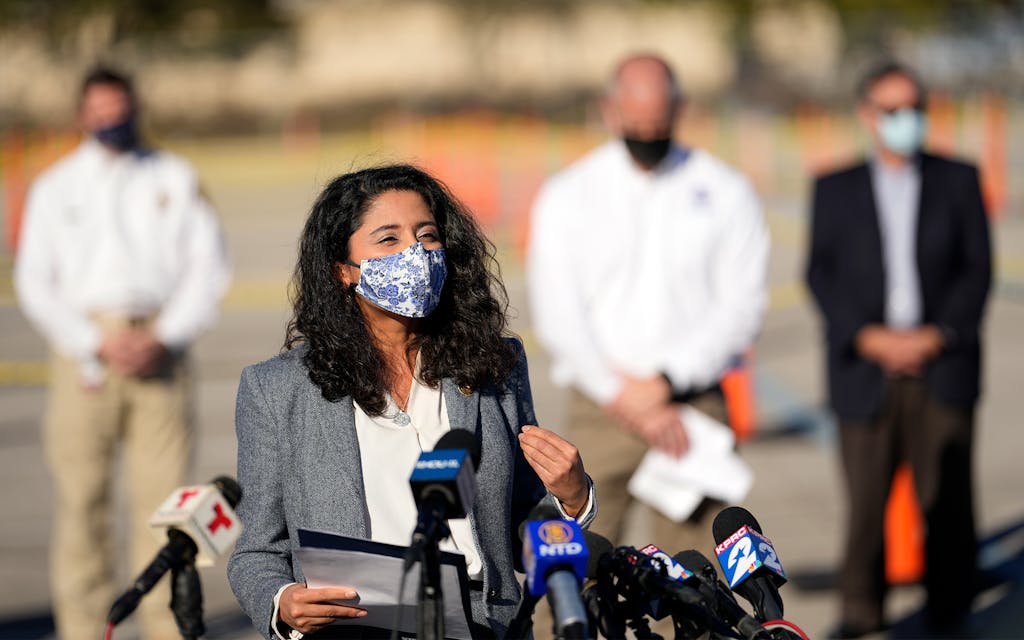
Republicans Fight for Relevance in Harris County
Michael Hardy, 5:22 p.m.
No Republican has won a countywide race in Harris County since 2014, but the local GOP is praying that a wave election in November will end their losing streak. First, though, they have to pick candidates to go up against the all-Democrat slate of incumbents. The biggest target is Lina Hidalgo, the county’s top executive, who upset moderate Republican Ed Emmett in 2018 and has generated Republican enmity with her progressive rhetoric and COVID-19 health measures. No fewer than nine candidates are vying for the chance to go up against Hidalgo, the strongest of whom appear to be Mattress Mack–endorsed retired Army captain Alexandra del Moral Mealer and Dan Crenshaw–endorsed attorney Vidal Martinez.
We’re also watching the normally sleepy judicial races, which have been roiled by controversy over bail reform and rising homicides. Fourteen prosecutors from the office of District Attorney Kim Ogg, who has repeatedly criticized sitting judges for setting low bail, are challenging the slate of progressive criminal court judges.
Checking In on Our 2021 Worst Legislators
Ben Rowen, 5:15 p.m.
Last year, we picked a group of ten legislators (well eight legislators, the lieutenant governor, and one full caucus) for our biennial Worst list. For some, getting on the list is a badge of honor—a plaudit they can wave to their supporters as evidence that they must be doing something right, since the “fake news media” disparages them. For example, the day we posted the 2021 list online, Briscoe Cain—a representative from Deer Park, in the Houston outskirts, who had fumbled a major bill he was tasked with handling—posted on his official Facebook page that “he considered it an honor” and used the “award” as a promotional blurb.
Taking a look at the reelection chances of the Worsts reveals, unsurprisingly, that Texas Monthly’s vote of no confidence has not swayed the masses (you can read the list, and the reasons for each legislator’s selection, here):
Senators Charles Perry (R-Lubbock) and Bryan Hughes (R-Mineola) are both running unopposed in the primary and general elections. Representative Briscoe Cain (R–Deer Park) and Senator Bob Hall (R-Edgewood), meanwhile, are running unopposed in the primary, but will each face a Democratic challenger in November.
Representative Kyle Biedermman (R-Fredericksburg) is not seeking reelection. I wrote about the primary to fill his seat earlier today at 4:42 p.m. if you want to scroll all the way back.
The entire Senate Democratic caucus: Of the thirteen Senate Democrats, one, Eddie Lucio Jr., is retiring, and eleven will not face primary opposition (three of them will also not face a general election opponent). That leaves a single incumbent, John Whitmire of Houston—the dean of the Texas Senate—with a challenger. Whitmire has announced a 2023 bid to be Houston’s mayor; his primary opponent, Molly Cook, has hammered him for running for two offices at once.
Representative Harold Dutton Jr. (D-Houston) faces one primary challenger, Candis Houston, who is backed by a host of progressive groups including the AFL-CIO, Annie’s List, and a PAC called Texans for Better Democrats Coalition.
Representative Gary Gates (R-Richmond) is being primaried by Robert Boettcher, who serves on the Sugar Land Zoning Board and was a precinct chair for the Fort Bend County GOP. Boettcher’s been endorsed by the right-wing grassroots organization True Texas Project, a onetime kingmaker. Just as we did, Boettcher highlights two issues in his criticisms of Gates, a landlord. First, a bill he introduced to exempt landlords from building codes. And second, a bill he introduced to make it harder for Child Protective Services to accept anonymous tips.
Lieutenant Governor Dan Patrick (R-Statewide) faces five primary opponents in his reelection bid, none of whom are registering in the polls. The most interesting races to follow involving Patrick are the legislative ones in which he’s endorsed. We’ll be tracking throughout the night how much success he has handpicking who will work with—or rather for—him in the Senate.
Representative Steve Toth (R–The Woodlands) faces one primary challenger, Maris Blair, an attorney and the executive director of the Conroe ISD Education Foundation. Blair, who does not have an issues page on her website, has attacked Toth for unsuccessfully suing Greg Abbott over a contact tracing contract and wasting “valuable time battling our conservative leaders.” Toth is endorsed by Ted Cruz, the NRA, and a host of right-wing grassroots groups—to whom his challenges of establishment Republicans are one of his greatest merits.
Texas House Republican Candidates Battle to Be the Most MAGA
Ben Rowen, 4:59 p.m.
In some primaries, candidates offer competing visions for their party (e.g. Should Democrats fight Republicans, or acquiesce to them to try to earn concessions? Should Republican lawmakers require natural gas producers to weatherize their facilities or not?). In others—most, perhaps—candidates offer the same vision, but maybe one is looking through Trump shades while the other prefers to see through red, white, and blue–tinted contacts. Here is one Texas House race we’re watching that’s the latter type, and one that’s the former.
House District 19 (Boerne, Burnet, Fredericksburg): Last year, we had a tough time selecting our “Worst Legislators”—there was an embarrassment of riches. One selection, however, was easy: Kyle Biedermann. The representative from Fredericksburg, eighty miles west of Austin, filed a bill to call for Texas secession, and he was near the U.S. Capitol steps on January 6 when rioters stormed the building. It seems Biedermann didn’t make many friends within his caucus, either: when the new state House maps came out, his district had been chopped into two. He declined to seek reelection in either.
In his stead, three candidates are vying for the seat. Austin police officer Justin Berry is running on a pro–law enforcement platform. He’s been indicted on charges that he used excessive force in 2020 during protests in the city over the murder of George Floyd—and some politicos believe that could help him in the primary. Meanwhile, most of the money in the race is behind former Austin City Council member Ellen Troxclair, who vows to block the creep of Austin values toward its ’burbs. Then there’s Nubia Devine, who three decades ago left Venezuela for Texas “as communism took hold.” Devine, who’s a former aide to a GOP Austin city councilman and the wife of Texas Supreme Court justice John Devine, is offering a standard 2022 GOP platform of securing the border, improving “election integrity,” and ending gender-affirming care for trans minors.
Biedermann, for his part, supports Devine. He told me in January, “I believe that Nubia Devine being Hispanic, and a woman, would be actually a better voice than I am in the Texas House floor, because there is not a single Hispanic woman in the Republican caucus. And I think that’s important—not because I believe in diversity, which is what people say. I believe [that] we, as you know, unfortunately, white males, we don’t really get a voice.”
House District 31 (Poteet, Falfurrias, Rio Grande City): Seven-term Democratic representative Ryan Guillen made headlines in November for switching parties and becoming a Republican. The move was likely a political necessity: along with the South Texas rightward shift in 2020, his district got thoroughly gerrymandered (Trump would have won it by 25 points had it existed in 2020). Guillen received a hero’s welcome in his new party. Donald Trump endorsed him, as did Greg Abbott and Speaker of the Texas House Dade Phelan. With the top of the party in line, and with the benefits of incumbency, Guillen is likely to prevail against his two challengers. But while the GOP leadership supports him, might some rank-and-file rightwing primary voters hold his former party affiliation against him? One challenger, Mike Monreal, is a Navy vet endorsed by several grassroots groups who pitches himself as a “man of courage” against Guillen’s “politician of convenience.” A second challenger, Alena Berlanga, is a Floresville ISD board member who was served arrest warrants last summer related to the theft of a donkey.
House Dems-els in Distress
Ben Rowen, 4:42 p.m.
A quick refresher on 2021’s budding of the perennial “Dems in disarray” flower: the party’s caucus in the Texas House was split last year on how to approach the thorny problem of having no power. Was it best to be accommodating and collegial with Republicans to try to earn marginal concessions, and ultimately get steamrolled? Or was it best to fight tooth and nail, delay, delay, delay, and ultimately get steamrolled? The two approaches came to a head with SB 1, the “election integrity” bill which most everyone in the Democratic caucus recognized as an attempt to make it harder to vote and to hurt their party’s chances of winning elections.
House Democrats dramatically walked out of the Capitol on the final night of the regular session, denying Republicans a quorum necessary to pass the bill—and then most in the caucus went to Washington, D.C., to continue denying a quorum in the first special session Abbott called. At the end of that special session, things got testy: some in the caucus decided to stay in D.C.; others came home, restoring a quorum for a second special session and ensuring that SB 1 would pass. Which brings us to two key primaries with candidates offering competing visions for the party:
House District 79 (El Paso): Two-term representative Art Fierro was in the first group of four House Democrats to return to Austin in August. His opponent, Claudia Ordaz Perez, a one-term representative who was subsequently redistricted into the Seventy-ninth, remained in D.C. She launched her campaign around Fierro’s decision to return. (Lawyers for Fierro lost a lawsuit challenging her eligibility to run in the district.) Joe Moody, the El Paso Democrat and Speaker pro tempore of the House who also returned to Austin with Fierro, has endorsed Fierro. Meanwhile, some representatives who remained in D.C., and the Texans for Better Democrats Coalition, a new progressive PAC, have endorsed Perez.
House District 114 (Dallas): “Opposition standard-bearer in the House … whose fiery conscience was matched only by his temper.” That’s how Paul Burka described John Bryant in his second consecutive selection as a Best in our 1977 ranking of legislators. After serving four terms, Bryant left for the U.S. House, where he served seven terms. Now, at 75, he’s running for state House again to replace retiring Democrat John Turner, compelled to reenter politics, Bryant says, because “Democrats are losing every single battle [and] it was time to step up and try to provide some leadership.” He faces four Democrats, all in their thirties, who, like him, promise to fight Republicans on voting rights issues. Questions abound about whether an old, white Democrat in a majority non-white district is the appropriate standard-bearer for the party. (Bryant does tout the endorsement of some “bald eagles of White Rock Lake” on his website, however).

The Imaginarium of Dan Patrick
Ben Rowen, 4:29 p.m.
Texas Legislature observers often pithily remark that the state Senate has only one member: so complete is Lieutenant Governor Dan Patrick’s control of the body that mostly it does whatever he wants. But fresh off redistricting, there will be 31 senators elected this year. (They will then draw lots to determine who’s up again in two years, and who gets to serve a full four-year term). Nine candidates are running unopposed in both the primary and the general election, and in another eleven races there won’t be a primary contest for either party. In a state with new maps designed to limit interparty competition, that means there’s not much in the way of intrigue in the Senate. Of the eleven races with a Democratic or Republican primary, or both, here are two we’re watching:
GOP primary in Senate District 31 (Amarillo, Midland, Odessa): If the GOP caucus in the Texas Senate had a second member the last few sessions, it was Kel Seliger, from Amarillo. The “local control” advocate—who opposed state laws dictating how local governments could levy taxes—often sparred intellectually with Patrick, and occasionally would even vote against him, for which he was stripped of his committee chairmanships. Seliger’s district is a bizarre one to have produced a centrist (by Texas Lege standards) Republican: It was the most Trump-voting of all 31 state Senate districts. Nonetheless, in the fall, Seliger voted against a bill Donald Trump had called for that would have required a full audit of the 2020 election results. An hour later the former president endorsed Kevin Sparks, an oilman from Midland who’d announced a primary challenge, and shortly thereafter Seliger decided not to seek reelection.
Sparks now faces three other opponents in the primary: Stormy Bradley, a Coahoma ISD trustee and crusader against critical race theory; Tim Reid, a former FBI agent and local control advocate (it would somehow keep CRT out of schools, in his telling); and Jesse Quackenbush, a pro–wind energy attorney. With the endorsements of Trump, Patrick, Ted Cruz, Rick Perry, and countless other big-timers in state and national politics, it’s Spark’s race to lose. No Democrat has launched what would have been a quixotic bid, so if Sparks prevails tonight or in a May runoff, Dan Patrick will have completed his sweep of the Senate.
Democratic Primary in Senate District 27 (Brownsville, McAllen, Harlingen): The most conservative member of the Democratic caucus in the Senate in the 2021 session, Eddie Lucio Jr. announced his retirement last year. The race to win his party’s nomination features a near-complete spectrum of the Democratic big tent coalition. Sara Stapleton-Barrera, a Brownsville attorney who forced Lucio into a runoff in 2020, is a progressive activist. Alex Dominguez, a two-term Texas representative, offers establishment politics more in line with the state Democratic party. Morgan LaMantia, an attorney and Democratic donor whom Lucio and many South Texas Democrats have rallied behind, has positioned herself as a “different Democrat” in the South Texas Lucio mold (though she breaks with him on abortion rights). And Salomon Torres, a Harlingen business consultant, is openly conservative. Whoever prevails will put to test what type of Democrat can win in a rightward-shifting South Texas.
U.S. House Races
Will Ted Cruz’s Maverick Endorsement Pay Off?
Dan Solomon, 4:16 p.m.
In 2020, Ted Cruz bucked the GOP establishment during a hotly contested runoff in Texas’s Twenty-third Congressional District by backing Raul Reyes over Tony Gonzales. The two candidates had similar platforms, but Donald Trump had endorsed Gonzales, while Cruz favored Reyes. Gonzales won a runoff election that was essentially a tie (he eked it out by a mere seven votes) and took the general election in November, while Cruz’s endorsement of his opponent was largely forgotten.
This time out, Cruz has weighed in against the GOP establishment in another contested U.S. House primary, the open seat in Texas’s Eighth Congressional District, north of Houston. Here Cruz has lent his backing to Christian Collins, a former aide who’s up against a field that includes Morgan Luttrell, a Navy SEAL with backing from Dan Crenshaw, Dan Patrick, and Rick Perry. The two candidates are more or less ideological twins, with their differences being largely matters of style—Collins has vowed to join the tea-party-affiliated House Freedom Caucus if elected, for example, while Luttrell, who’s backed by the (relatively) more mainstream Congressional Leadership Fund PAC, wants to get to Washington before he makes that decision.
Bucking the majority of Texas’s GOP establishment makes a certain amount of strategic sense for Cruz, who hasn’t made being well-liked by his colleages a top priority. If Luttrell wins, then Cruz still managed, at little cost, to burnish his brand as a politician who’s not beholden to the establishment; but if Collins wins, then a Cruz-backed candidate overcame someone most other leading Texas GOP figures supported, and Cruz can claim to be a kingmaker.
There are nine other candidates in the race, none of whom enjoy the sort of backing that Luttrell or Collins do. While there’s no polling in the race, the sharps over at politics betting site PredictIt.org certainly seem to think that Cruz’s Midas touch will take at least another election cycle to come into effect—as of Monday night, you had to bet $90 on Luttrell to win in order to take home $100.
Bonfire of the MAGA-T’s
Forrest Wilder, 3:59 p.m.
Will Republicans running on a “Stop the Steal” platform find enough purchase among the GOP grassroots to give them an edge over more conventional candidates? To even ask such a horse race question while the democratic form of government teeters is frustrating. But, hey, it’s 2022 and this is the world we live in.
A not-insignificant number of Texas congressional candidates have made the “Big Lie” and January 6 revisionism a central plank in their campaigns. The marquee race is arguably in the Third Congressional District, a patch of Collin County, the rich, booming ’burbs of Prosper and McKinney, north of Dallas. Redistricting turned an increasingly competitive district into a super-Trump enclave, creating the conditions for the far right to mount a challenge to Congressman Van Taylor, a conservative who has nonetheless cultivated a reputation as “Mr. Bipartisan.” Taylor’s particular sin was being one of just five Texas Republicans in January 2021 to vote to certify the election results in Arizona and Pennsylvania instead of acting on Trump’s ludicrous stolen-election fable. Taylor also voted in favor of a bipartisan, independent commission to investigate the January 6 mob at the U.S. Capitol. He was rewarded with four challengers, including two seemingly serious opponents, businesswoman Suzanne Harp and former Collin County judge Keith Self—both of whom have excoriated Taylor for his votes. However, neither has particularly caught fire, so it’s possible Taylor escapes without a runoff.
Elsewhere, the open seat for the Eighth Congressional District in the Houston ’burbs features a proxy war between two factions of the GOP—pro-Trump hardliners and somewhat more institutionalist conservatives—represented respectivly by far-right activist Christian Collins and former Navy SEAL Morgan Luttrell. Collins in particular has embraced the Big Lie, calling for a national audit and surrounding himself with Trump conspiracists such as MyPillow.com CEO Mike Lindell and Congresswoman Marjorie Taylor Greene.
And then there’s of course Texas attorney general Ken Paxton, who infamously tried to use the courts to overturn the 2020 election. His main opponents, George P. Bush and Eva Guzman, have fanned the flames of doubt around the integrity of mail-in ballots but have generally steered clear of stop-the-steal rhetoric.
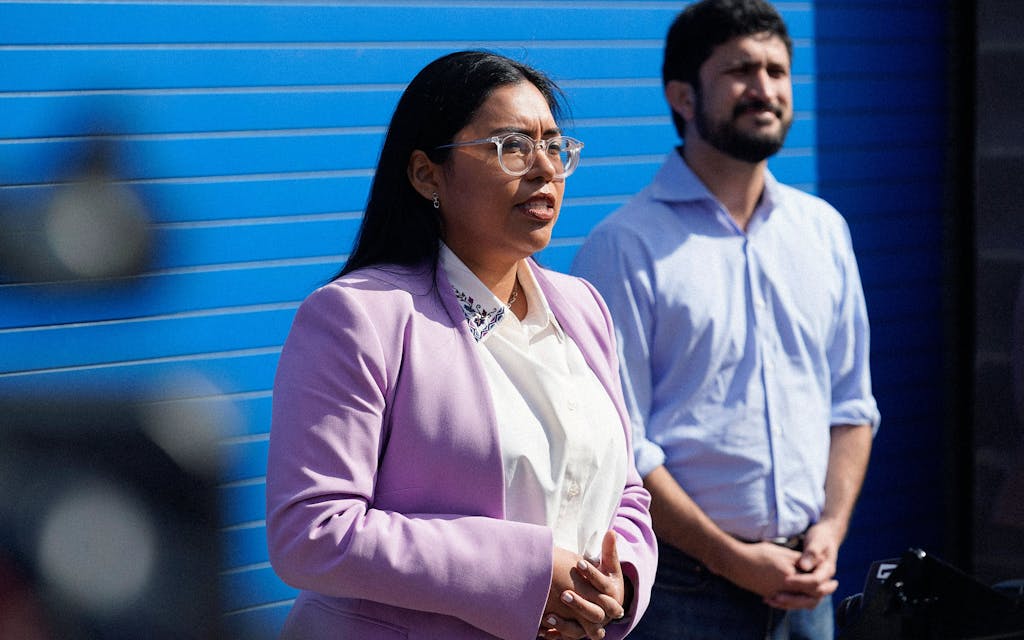
Checking In on the Democratic Socialists in Texas
Forrest Wilder, 3:46 p.m.
When Bernie Sanders ran for president in 2020, he drew big crowds in Texas cities—and plenty of small-dollar campaign contributors as well as the votes of Hispanic and young Texans, even as he narrowly lost to Joe Biden in Texas on Super Tuesday, the set of primaries that signaled the beginning of the end for his campaign. But the Vermont socialist could count on only a handful of endorsements from Texas elected officials, a smattering of local politicians barely known outside their communities.
One of those lonely stalwarts was Greg Casar, a 32-year-old former Austin city councilman who was one of the few democratic socialists in office in Texas. Now he’s the Bernie-backed front-runner in the Thirty-fifth Congressional District, a super-blue patch of Central Texas that runs from San Antonio to Austin. A former labor organizer who helped push Austin city politics to the left, Casar is running an unapologetically progressive, Bernie- and AOC-style campaign that centerpieces Medicare for all, a $15 minimum wage, and labor protections such as paid sick leave. Casar is trying to avoid a runoff against his three opponents, state representative Eddie Rodriguez and former San Antonio city council members Rebecca Viagran and Carla-Joy Sisco.
Along with Jessica Cisneros, who is challenging longtime conservative Laredo congressman Henry Cuellar for a second time, Casar’s candidacy represents a bet that Texas Democratic primary voters are in the mood for lefty politicos. This is also the first major test in 2022 for AOC, Justice Democrats, Our Revolution, and the anti-establishment politics of the Squad.
Tejanos Are Democratic Socialists! Or They’re Trump Voters! Or Both!
Jack Herrera, 3:30 p.m.
Two high-octane congressional races are heating up in majority-Hispanic districts in South Texas, testing the bounds of what politics can win there. In a rematch of a 2020 race, the AOC-aligned human rights lawyer Jessica Cisneros is trying to take down Congressman Henry Cuellar, one of the most conservative Democrats in the House, representing Laredo and the Twenty-eighth district. Just down the Rio Grande, in McAllen and the Fifteenth district, Monica De La Cruz is trying to prove that Trumpist politics can win in South Texas. In the Republican primary, she’s got major endorsements from national figures like Senator Ted Cruz, Representative Dan Crenshaw, and even a certain billionaire former president.
Here’s the thing: Jessica Cisneros and Monica De La Cruz both have a potential path to victory today, and in November. With almost $2 million in her war chest, De La Cruz is expected to win her primary (though a hard-core January 6 conspiracy theorist, Mauro Garza, might be gaining on her—at least one of the PACs supporting her seems to have increased spending late in the race to help her avoid a runoff). If she secures the nomination, the latest round of redistricting has created a district for her that would have gone for Trump by nearly three points had it existed in 2020 (the old district went for Biden by two, a shockingly close result that persuaded the Democratic incumbent, Vicente Gonzalez, to seek election elsewhere). The race is De La Cruz’s to lose.
Cisneros, for her part, might be able to take Cuellar down this year, after coming just 3.6 points short in 2020. Besides prominent endorsements from Julián Castro and the San Antonio Express-News, she’s gotten a powerful assist from … the Federal Bureau of Investigation. In late January, the FBI raided Cuellar’s Laredo home in a wide-ranging investigation into a web of U.S. businessmen and the government of Azerbaijan. But no charges have yet been filed against Cuellar, and he remains in the race. None of his endorsers, a list which includes over 171 current and former elected officials in the Twenty-eighth district (including Laredo’s mayor Peter Saenz), have publicly dropped him. Whichever Democrat wins in Twenty-eighth will likely beat the Republican opponent. Even though Trump and the GOP made remarkable gains in the Twenty-eighth in 2020, the district still elected Biden and Cuellar by double digits. It’s a safe(ish) Democratic seat.
What’s going on in South Texas? How are left-wing Democrats and Trumpists both pulling crowds? The clearest through line is economic populism. Residents of South Texas—one of the most economically disenfranchised regions of the country—seem tired of working their asses off only to see elites get richer. That energy led, in part, to Trump’s surge in the 2020 general. It also let Bernie Sanders handily sweep the Democratic primary in each South Texas county. So what’s the future of politics in South Texas? ¿Quién sabe? We’ll have to wait and see.
The Battles of Dan Cringeshaw
Michael Hardy, 3:19 p.m.
The greater Houston area features some fascinating Republican congressional races. Last year the Legislature redrew the district represented by rising star Dan Crenshaw, the Second Congressional District, to make it even more heavily Republican. The new map removed liberal enclaves such as Houston’s Montrose neighborhood while adding suburban conservative redoubts such as the Woodlands. While Crenshaw is favored to win his primary, his criticisms of Trump and the House Freedom Caucus—he called the latter performance artists and grifters—have made him a target for far-right activists, who have taken to calling him “Cringeshaw.” We’ll be watching to see how much support Crenshaw loses.
Crenshaw has become such a polarizing figure within the GOP that the Republican primary for the Eighth Congressional District, which stretches from the Houston exurbs north to the Davy Crockett National Forest near Lufkin, has become a proxy battle between pro- and anti-Crenshaw forces. The two leading candidates are Morgan Luttrell, a Crenshaw-backed retired Navy SEAL, and political operative Christian Collins, who has been endorsed by the likes of Ted Cruz, Marjorie Taylor Greene, and Mike Lindell. “We sure do not like people calling themselves conservative, but all they really are is a performance artist themselves,” Greene said about Crenshaw at a political rally on February 19.
Also on our radar is the Thirty-eighth Congressional District, a brand-new district in west Houston that the Legislature appears to have created specifically for retired U.S. Army officer Wesley Hunt, a Black Republican who lost a close race to Democrat Lizzie Fletcher two years ago in the Seventh. Hunt was endorsed by Trump but faces nine challengers, the strongest of whom appears to be oil and gas engineer Mark Ramsey, who boasts the support of far-right Houston activist Steven Hotze. Can Hunt avoid a runoff in May?
Surveying the Statewide Candidates
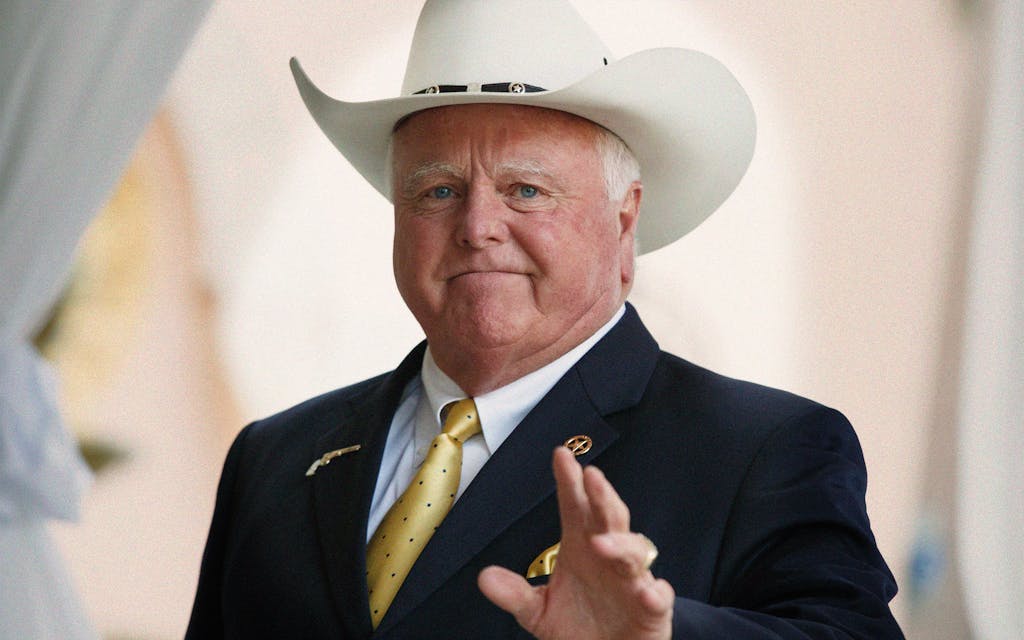
Will Sid Miller Be Put Out to Pasture?
Christopher Hooks, 3:01 p.m.
Agriculture commissioner Sid Miller looks and acts like a French cartoonist’s caricature of a Texan, which has surely been the key to his success. He’s loud, brash, bawdy, and bigoted, and it has seemed at times since his 2014 ascension to the lofty heights of his current office that he ran in order to get a bigger following for his Facebook page, where he posts jokes about cows giving birth or using nuclear weapons on “the Muslim world.” Miller’s tenure in office has often been bizarre, baffling. In 2016 he charged taxpayers for a trip he took to Oklahoma to get the “Jesus shot,” a cure by a quack doctor that promised to take away all pain.
Given that Miller’s reign has been both stupid and allegedly corrupt (his longtime adviser was indicted on felony charges that he was “selling” access to hemp licenses issued by Miller’s office, which he denies), it might be a surprise to learn that other GOPers in elected office don’t actually like Miller very much. With Abbott, it’s personal: Miller protested against Abbott’s COVID restrictions last year, even on the steps of the Governor’s Mansion. (Alongside then–GOP party chair Allen West.) With the Legislature, there have been many slights and crossed wires. Shortly after he took office, he was even barred from using parking spots on the Capitol grounds.
State representative James White, his challenger, is a well-regarded, well-liked lawmaker, a staunch conservative from East Texas and one of the state’s foremost Black Republicans. He has support, stated or unstated, from many of his colleagues in the Legislature and many Republican stalwarts around the state, including state senators Drew Springer and Charles Perry, which represent large swaths of rural Texas.
Will that be enough? The race for agriculture commissioner, a post that is intended to support farms and ranches but is usually treated a stepping-stone to higher office, is fairly low-profile, and it’s not clear if Miller’s troubles have broken through to the Republican grassroots. There’s a felony corruption charge pending against his longtime adviser, and that’s a big deal, but Republican elected officials’ main problem with Miller is that they find him annoying, a gadfly.
If White wins this primary, he’ll most likely become the first Black Texan elected to a major statewide office. If Miller wins, he will most likely continue posting.
Perhaps other Republicans, anticipating the latter outcome, have resorted merely to cramping his style. There’s a story Miller used to like to tell—most notably, during his speech at the 2014 GOP convention where he accepted his nomination. “I told my wife, ‘Did you ever think in your wildest dreams, that I’d be where I am tonight?’” Miller would tell crowds. “And she said, ‘Honey, you’re not in my wildest dreams.'” A good line, which always got a laugh.
At Donald Trump’s last rally in Texas, Lieutenant Governor Dan Patrick, who reportedly doesn’t like Miller, told a story of his own. “I said to my wife, ‘Jan, did you ever think I’d be the lieutenant governor of the state? In your wildest dreams could you imagine that?’” Patrick told the crowd. “She said, ‘Honey, I don’t want to burst your bubble, but in 47 years of marriage, you’ve never been in my wildest dreams.’” Don’t take the man’s jokes, it’s all he’s got!
Turn Texas Blah
Christopher Hooks, 2:44 p.m.
In the beginning, there was Garry Mauro, and it was good. Well, it wasn’t good, exactly—Mauro, then the land commissioner, lost the 1998 gubernatorial election to a fellow named W. Bush by 37 points, the worst performance the Democratic party had scored in recent elections. But W. was popular, and Mauro doomed, perhaps. In the race for lieutenant governor, Democrats performed much better. Agriculture commissioner Rick Perry scored only 50.04 percent against his old friend John Sharp, then state comptroller, a well-liked good-ol’-boy Democrat, who won 48.19 percent of the vote.
Sharp came closer than any statewide candidate has subsequently, and since 1994, the election that saw Ann Richards cast out for W. and the Democratic party’s long exile begun. The 1998 election, as dismal as it was in many respects for the minority party, was a high-water mark in the sense that it featured at least two Democratic candidates who had a proven track record of (relative) success in elected office.
That may seem like a low bar, but it has rarely been met since. Most Democratic candidates for high office have fallen into one of three camps the last two decades: well-meaning novices, self-funders, and eccentrics, like the lovable Jim Hogan, a goat farmer from Cleburne who effortlessly secured the 2014 nomination for agriculture commissioner against pothead troubadour Kinky Friedman and the party’s favored candidate, a rancher named Hugh Asa Fitzsimmons III. Even in 2018, a year when Democrats hoped to ride an anti-Trump wave, Beto O’Rourke outperformed expectations—but he had no one else under him to help.
It’s the same story this year. In 2022, there is once again only Beto O’Rourke, running for governor. Mike Collier, the probable lieutenant governor nominee, is a three-time candidate who has never held office. Joe Jaworski, who is contending for the attorney general nomination, was once mayor of Galveston, which makes him a relative heavyweight in terms of elected political experience. Apart from that, the candidates up and down the ballot are thin on bona fides.
Sure, the pool of credible Democrats who have held office and could run for these offices is smaller than it used to be—one consequence of the party’s having lost most elections for decades. But there are plenty of Democrats in the Legislature who are smart and could perform the jobs well. They are choosing not to run, and that is, in part, a vote of no confidence in the Democratic party.
Point this out to a party loyalist and the response is often to say that anybody would be better than the guys in office now. Maybe they would be, but the party needs to look serious before people will take it seriously. When the statewide slate is composed of seat-fillers the Democratic party looks less like a serious competitor to the GOP and more like the Greens—occupying space on the ballot that might go to an actual political party.
Which Democrats Will Advance in the Attorney General’s Race?
Dan Solomon, 2:30 p.m.
On the Republican side of the AG’s race, picking a favorite candidate is like picking a favorite Beatle—whoever you choose gives you the chance to tell yourself a story about who you are and what you value. On the Democratic side, though, it’s considerably more muddy. All four candidates have virtually the same platform, the same critiques of the way the AG’s office has been run under Ken Paxton, and the same promise to use its power as a check against the power wielded by Abbott, Patrick, and the GOP-controlled Lege. What’s an undecided voter to do?
We’ll get the first part of an answer to that question tonight, as the race is almost certainly headed to a runoff. Polling to this point has indicated that former ACLU lawyer Rochelle Garza’s a front-runner to advance, and most experts seem to think that either former Galveston mayor Joe Jaworski or Dallas civil rights attorney Lee Merritt will be the second. But former Houston judge Mike Fields doesn’t trail either of the two by much in the polls, and the most popular option for voters in those surveys was “undecided,” by a mile. When forty-some percent of the electorate doesn’t know much about any of the candidates, weird things can happen. Pick any two names out of a hat and it wouldn’t be a huge surprise to see them emerge. Merritt and Fields? Why not!
The upside of this for Texas Dems is that—assuming that “T. Bone” Raynor, the lone candidate who hasn’t actually campaigned for the job, doesn’t sneak in there—all of the candidates are serious, qualified options. In down-ballot statewide races, Texas Dems have frequently run wing-and-a-prayer campaigns, with standard-bearers who had no serious political backing and won the nomination unopposed. After 2018’s nominee, University of Texas Law adjunct professor Justin Nelson, ran an impressive campaign that saw him come within 3.6 points of Paxton, the party seems to have decided that this was, finally, a race worth getting into.
The Mexican Standoff Race for Attorney General
Forrest Wilder, 2:15 p.m.
In its final stretch, the Republican race for Texas attorney general started to resemble the Mexican standoff scene in Reservoir Dogs—four fellow travelers increasingly contemptuous and suspicious of each other pointing loaded weapons across the room. The combatants are Ken Paxton, the under-indictment incumbent AG who holds a lead in every poll; George P. Bush, the Texas land commissioner who is trying to pull off the difficult trick of running as a Bush who loves Trump, even though Trump won’t love him back; Eva Guzman, the former Texas Supreme Court justice who has virtually unlimited funding from Big Business interests; and the legendary East Texas congressman Louie Gohmert, who is running as the uncorrupt far-right alternative to Paxton.
In the final days of the race, Gohmert, underfunded and increasingly frustrated, has been calling Paxton a liar. Bush has called Guzman a “gutter politician.” Guzman has accused Bush of lying about her support for finishing the Trump border wall. Meanwhile, Paxton has mocked Bush as “Jeb Bush’s son,” described Guzman as “too woke for Texas,” and theorized that Gohmert was recruited by the establishment to siphon votes away from him.
But unlike in Quentin Tarantino’s violent fantasia, someone in this standoff will emerge with the loot—the GOP nomination to run the powerful, high-profile Texas AG’s office. For what it’s worth, the conventional wisdom—and the polling—suggests that this race is headed to a May runoff, almost certainly featuring Paxton and one of the other three, probably Bush, where some diminishingly small percentage of the Texas electorate will decide who will likely serve as the state’s top law enforcement officer. Is Paxton’s braggadocio that he might avoid a runoff more than just bluster? Do enough voters care that Paxton allegedly committed securities fraud, allegedly interfered in legal investigations around a wealthy supporter who had given Paxton’s mistress a job, and allegedly has been lying nonstop about the top aides who reported him for alleged abuse of office and bribery? We shall see!
The Top of the Ticket
Checking In on the Non-Abbotts
Ben Rowen, 1:59 p.m.
Greg Abbott has seven challengers in his GOP primary, but they fit nicely into three buckets. First, there’s a group of also-rans with somewhat unique policy positions—most notably including Kandy Kaye Horn, a Houston philanthropist who purchased online a barony of suspect provenance and wants to legalize marijuana. Second, there’s the other Rick Perry, a computer engineer from North Texas whose main credential is sharing a name with a relatively popular ex-governor (more on him below). And then there is the unified opposition, who think Abbott is too far . . . left: YouTube star Chad Prather, former state senator Don Huffines, and erstwhile chair of the Texas GOP Allen West, who have all agreed to support whoever among them reaches a run off, should one do so.
West and Huffines both made waves early in their candidacies. The former because his right-wing road show had traveled well enough between Florida, where he served as a U.S. congressman, and Texas, where he moved after losing his first bid for reelection. And the latter because he proved a fund-raising powerhouse (though as with other powerhouses in Texas, the reserves quickly ran dry). So close are Prather’s, West’s, and Huffines’s policy prescriptions that they are basically different steps in the evolution of the same right-winger: podcaster, provocateur, and politician. Most grassroots folks I talked to told me they have a preference (i.e. Prather, like Trump, is a “good showman”; Huffines is the most wonkish; West is the most “presidential”), but all said they’d have no problem supporting any of the trio.
Consider a man at a tea party event in Fredericksburg whom I watched approach Huffines and regale him with a tale from the anti-Abbott trenches. The tea partier told Huffines that he’d gotten a call from the governor’s campaign earlier that week, and described yelling back into the void about Abbott’s border policy. Then he recounted his sign-off: “Thank you for your call Mr. Abbott, but I’m supporting Don Huffines.”
Later, as he ate barbecue and listened to a deluge of right-wing speakers, I sat near him. The tea party activist repeated the same story about the call to me. But this time it had a different punch line: “Thank you for your call Mr. Abbott, but I’m supporting Allen West.”
What If the Other Rick Perry Makes It Into a Runoff?
Dan Solomon, 1:45 p.m.
According to the polls, Greg Abbott is poised to cruise to the nomination for his current job without facing a runoff: in the three latest surveys (from the University of Texas/Texas Tribune, UT-Tyler/Dallas Morning News, and Emerson/The Hill), he’s consistently held support from around 60 percent of likely Republican voters.
But polling is an inaccurate science, and it’s possible that the anti-Abbott vote that led so many to challenge him is stronger than pollsters account for. There’s one particularly wacky possibility: according to the UT-Tyler/Dallas Morning News poll, Weatherford resident Ricky Lynn Perry, on the ballot as “Rick Perry,” is as competitive as anyone, and more competitive than most. In that poll, conducted February 8–15, Perry—whom we want to make absolutely clear is just some guy whose name is Rick Perry, and not the governor who preceded Abbott—brought in 6 percent of the support from a field that also included 15 percent undecided voters. It takes a few (admittedly) large leaps, but bear with us. First, the majority of those undecided voters cast anti-Abbott ballots for Rick Perry, out of nostalgia for the old governor. Second, the other challengers to Abbott—Don Huffines, Allen West, Chad Prather, etc.—all do a little better than polls suggest they will, eating into the governor’s support. Instead of Abbott taking 61 percent of the vote, he comes in at 49.9 percent and Ricky Lynn Perry, who did not run a campaign (and, in fact, deleted his own LinkedIn page after filing his candidacy), finishes second by a razor-thin margin, and makes a runoff with the governor of Texas.
Unlikely? Absolutely—but weird things have happened in Texas primaries before. (In 2016, the Travis County GOP elected a chairman who wore a jester hat to party meetings and whose Twitter account was populated with conspiracy theories about Donald Trump and posts about his love of anatomically improbable cartoon breasts!) But more than anything, the fact that Perry is polling in the same ballpark as competitors who entered the race with the intention of winning it—in that UT-Tyler/DMN poll, he’s a single point behind West and three points ahead of Huffines—is a testament to the fact that Republicans who don’t like Greg Abbott have also struggled mightily to rally behind a competitor. While the overwhelmingly likely scenario is that Abbott escapes a runoff with any of them, if he ends up underperforming, Ricky Lynn Perry seems about as viable as anyone to place second. (Just imagine if Dan Patrick had been successful in his attempts to persuade the other Rick Perry to get into the race!)
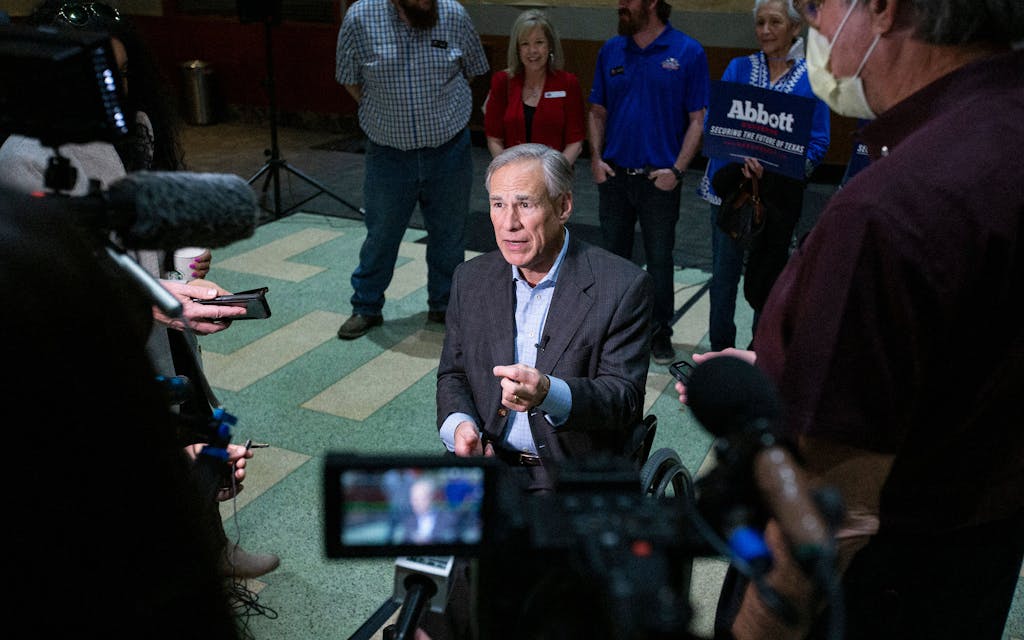
The Age of Abbott
Christopher Hooks, 1:31 p.m.
Rick Perry, according to ancient legend, didn’t impress people much when he became governor in 2000. Indeed, the cuneiform tablets we’ve recovered from the period suggest he was picked because the Bush machine that embraced him found him inoffensive enough to make him W.’s heir. But then he won reelection, and then won again, and again, and it became hard to remember what Texas politics was like without him. By the time he stepped down—and he could probably have easily been reelected once more—his gubernatorial tenure was old enough to get a learner’s permit.
Greg Abbott did not impress people much either when he ran for governor. He has never impressed Democrats, of course, but Republicans from the establishment to the grassroots have always privately expressed the belief that he was an empty suit, a man who liked raising money and wasn’t too sure what he wanted to do with the job. His enemies spread rumors he wanted only one term. But he, too, won reelection, and now he’s posed to win reelection again, barring a very long-shot victory by Beto O’Rourke. There’s no way to know whether we’re closer to the end of Abbott’s time in the Governor’s Mansion or to the beginning of it.
Polls say he’s set to clear the 50 percent threshold necessary to escape a runoff, with a fairly comfortable margin. (If he’s forced into one, it will be a shock that will completely rewrite politics in Texas.) Polls also suggest he will beat O’Rourke handily. (Though much can change.) In January, Abbott reported some $62 million in campaign cash on hand. That’s all the more impressive given the very rough few years he has had: he was criticized in scathing terms from the right and the left over his handling of the coronavirus pandemic, and then oversaw the collapse of the power grid in 2021, for which he has deftly escaped scrutiny and blame, though he deserves both in ample measure.
In private, Republicans up and down the hierarchy will still privately assert that he’s much less than he appears—that he is, as his opponent Allen West puts it, nothing but a “campaign war chest.” The Texas Tribune even reported that Lieutenant Governor Dan Patrick tried to recruit Perry to run against Abbott. (Patrick denied it in a fuzzy sort of way.) And yet: Abbott remains, his approval ratings still relatively strong, his donors still happy, his enemies—perhaps—still unable to leave a scratch. He is on the verge of a third term, looking more inevitable than ever.
Abbott’s advisers suggested he might run for president, but it is perhaps not too early to think about a fourth term. By the next election, he could have raised $80 million—even $100 million. With sixteen years in office, he would become the longest-serving governor in Texas history, putting the haters to shame once and for all. Hell, why not twenty?
Where Have all the Voters Gone?
How Will SB 1 Affect Voting?
Michael Hardy, 1:17 p.m.
In the run-up to primary day, much of the media coverage has focused on the disruptions to early voting caused by Senate Bill 1, the election reform law passed by the GOP-dominated Legislature last year. According to voter data obtained by the New York Times, election officials in the state’s most populous counties had rejected 10 percent of absentee ballot applications as of February 18, a major increase from past years. In Harris County, the largest, that number was 30 percent. The main culprit is a new requirement that voters use the same form of ID to request a paper ballot that they originally used to register—a major hassle for people who registered to vote decades ago.
One big question looming over today’s election is how many people had a chance to correct their absentee ballot applications in time to vote—mail ballots must be delivered by Wednesday afternoon to be counted. (In Texas, vote by mail is generally limited to residents 65 and older.) Another provision of SB 1 requires intensified audits of voter rolls, which has forced election administrators to mail thousands of “challenge” letters threatening to kick voters off the rolls if they don’t prove their eligibility. The Secretary of State’s office acknowledged to Texas Monthly that some legally registered voters received such letters, raising the question of how many were able to get reinstated prior to primary day.
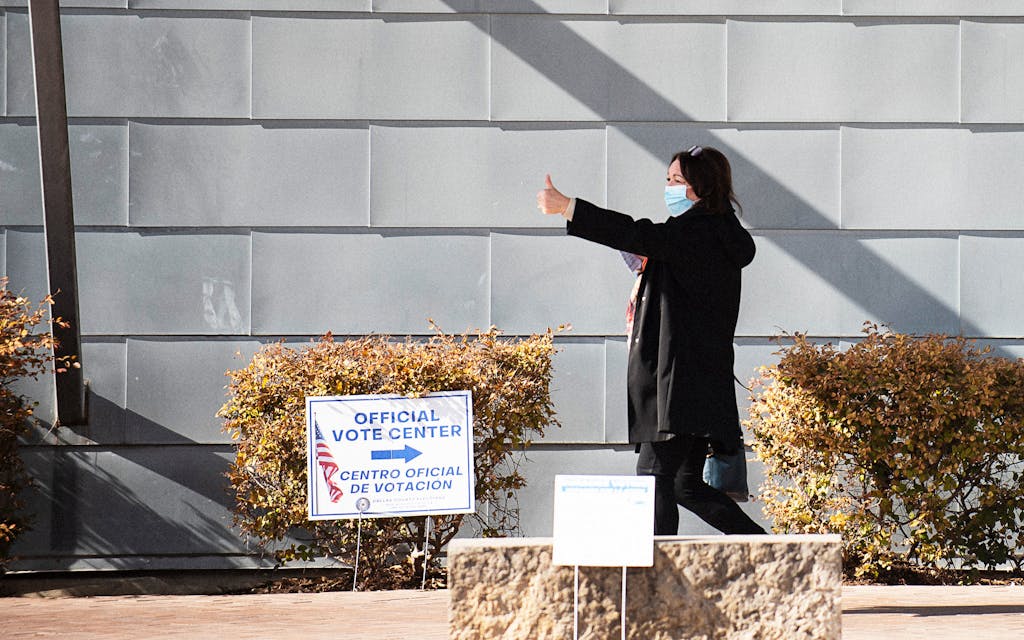
Of the Few, by the Few, for the Few
Christopher Hooks, 1:01 p.m.
Hear ye, hear ye, it’s Election Day! Elections are how republics restore themselves, refreshed year after year with the consent and input of the people. Every vibrant democracy has its own traditions and rituals. Australians cook sausages outside polling stations. The British take their dogs to the polls; Japanese politicians fill in the eyes of Daruma dolls.
In Texas our tradition is different: we reflect on how little the votes of most people matter here. And there’s no better opportunity to observe this tradition than early March in an election year, when a million or so voters in the Republican primary—4 to 5 percent of the voting public—determine the course of the state for the next four years.
Very few offices across Texas are seriously contested in the general election in November. Of the 38 congressional districts, only a few will see serious investment by both sides. In 31 state Senate districts, perhaps one or two will. Of 150 state House races, maybe a half dozen could be considered competitive at all. Of course, statewide races are hardly ever competitive: Democrats haven’t won one in 27 years.
On Monday, Texas political data guru Derek Ryan crunched the numbers on early voting and estimated that, after the polls close today, about 1.3 million votes will have been cast in the Democratic primary, and 1.85 million in the Republican primary. That’s out of a total of some 17 million registered voters in Texas. If 950,000 votes are necessary to win a majority of votes in the GOP primary, and thus victory in statewide office in November, that comes to about 5.5 percent of all voters—or 3.2 percent of all Texans—deciding who leads us. In state House races, dozens of votes can determine the outcome in the primary, leading to the undo influence of unusual people on both sides.
There’s nothing new about this, and it’s not clear if there’s any way to fix it. The irrelevance of everything except the GOP primary is such a fact of life now that it has become part of the state’s wallpaper. But it’s the central fact of Texas politics. Nearly everything that’s wrong or even just weird about the governance of this state flows from March, with the first warm weather.
- More About:
- Politics & Policy
- Texas Lege
- Ken Paxton
- Greg Abbott






